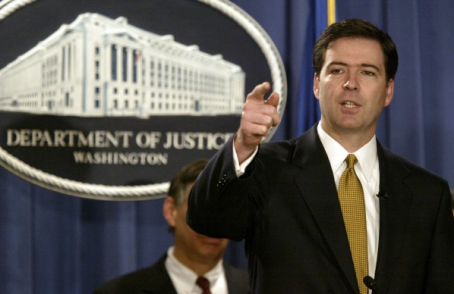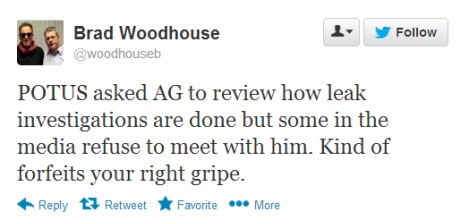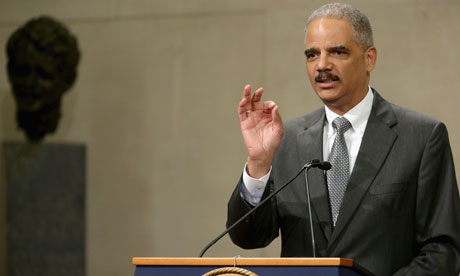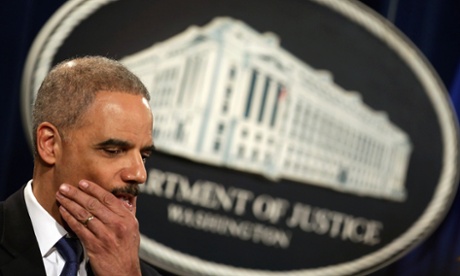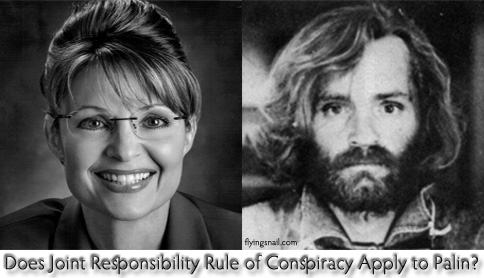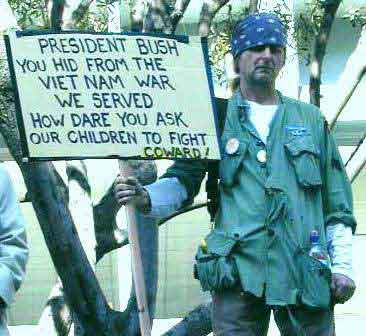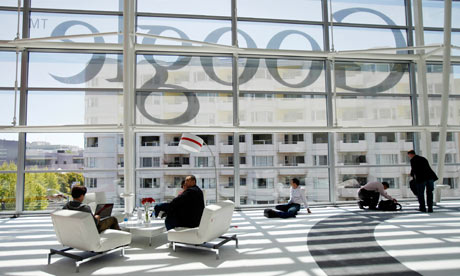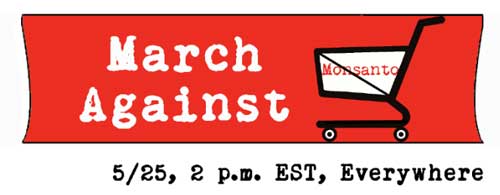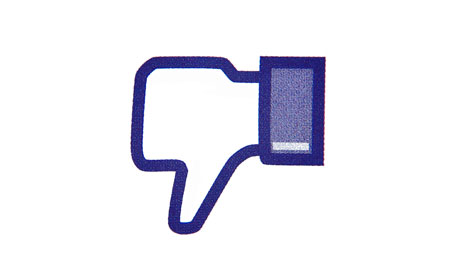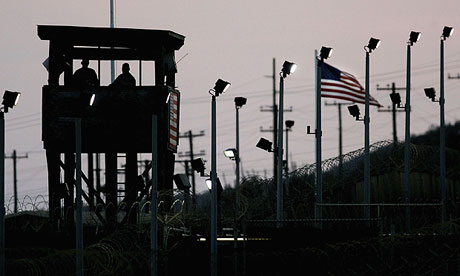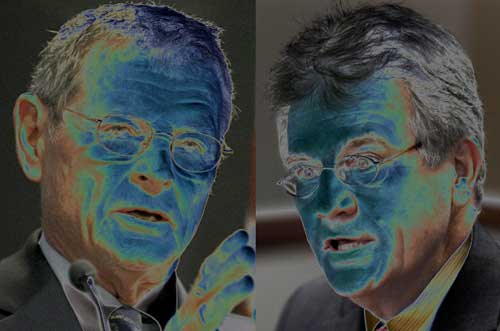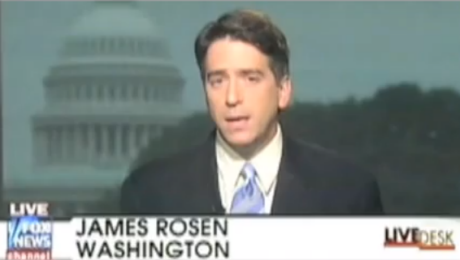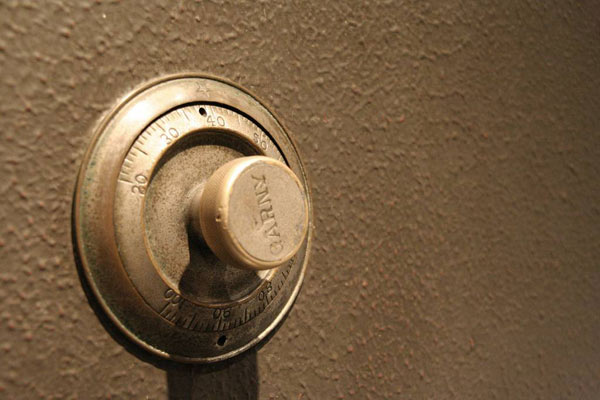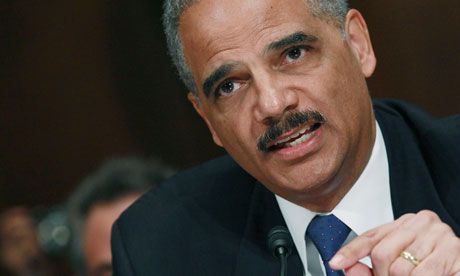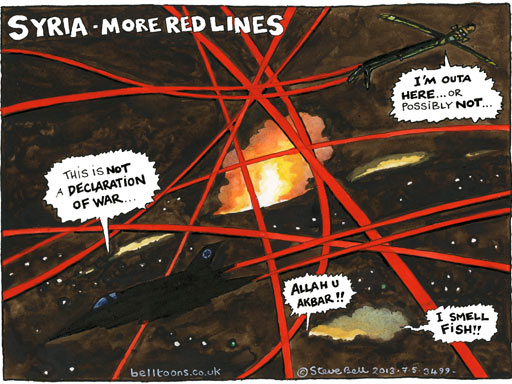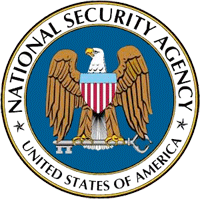
Tell-A-Vision = Google Is Evil = Why Not Try Love Again?

Cree Prophecy
Only after the last tree has been cut down,
Only after the last river has been poisoned,
Only after the last fish has been caught,
Only then will you find money cannot be eaten.
Obama's new FBI chief approved Bush's
NSA warrantless wiretapping schemeJames Comey becomes just the latest symbol of the Obama legacy: normalizing what was very recently viewed as radical
Glenn Greenwald, guardian.co.uk, Thursday 30 May 2013 08.57 EDT, Article Source
James Comey, Deputy Attorney General under President Bush, is reported to be President Obama's
pick to lead the FBI. File photo from Jan. 14, 2004. Photograph: Evan Vucci, File/Associated Press(updated below - Update II - Update III)
One of the biggest scandals of the Bush administration (which is really saying something) began on December 16, 2005. That was when the New York Times' James Risen and Eric Lichtblau were finally allowed to reveal what they had learned more than a year earlier: namely, that President Bush, in 2002, had ordered the National Security Agency to eavesdrop on the electronic communications of US citizens without first obtaining warrants from the FISA court as required by 30-year-old criminal law. For the next three years, they reported, the NSA "monitored the international telephone calls and international e-mail messages of hundreds, perhaps thousands, of people inside the United States without warrants." The two NYT reporters won the Pulitzer Prize for that story.
To say that progressives and liberals bellowed sustained outrage over that revelation is to understate the case. That NSA program was revealed less than two months after I first began writing about political issues, and I spent the next full year overwhelmingly focused on that story, and also wrote my first book on it. In progressive circles, the NSA warrantless eavesdropping program was the pure symbol of Bush/Cheney radicalism and lawlessness: they secretly decided that they were empowered to break the law, to commit what US statutes classified as felonies, based on extremist theories of executive power that held that the President, as Commander-in-Chief, was entitled under Article II of the Constitution to eavesdrop however he wanted in the name of national security, even if it meant doing exactly that which the law forbade.
The FISA law provided that anyone who eavesdrops without the required warrants - exactly what Bush officials did - is committing a felony "punishable by a fine of not more than $10,000 or imprisonment for not more than five years, or both" - for each offense. Moreover, all three federal judges who actually ruled on the merits of the Bush NSA warrantless eavesdropping program concluded that it violated the law.
So why, then, was there no accountability for this systematic illegal spying? That happened for two reasons. First, both the Bush DOJ and then the Obama DOJ successfully convinced obsequious federal courts that the eavesdropping program was so secretive that national security would be harmed if courts were to adjudicate its legality - in other words, top government officials should be placed above and beyond the rule of law because doing so is necessary to Keep Us Safe™. Second, the Bush DOJ's most senior lawyers - Attorney General John Ashcroft, Deputy Attorney General James Comey and OLC chief Jack Goldsmith - approved a legal memorandum in 2004 endorsing radical executive power theories and warped statutory interpretations, concluding that the Bush NSA warrantless eavesdropping program was legal, thus making it more difficult to prosecute the Bush officials who ordered it (even if the Obama DOJ were inclined to prosecute, which they were not).
It was announced yesterday that this very same James Comey - who as Bush's Deputy Attorney General authorized the once-very-controversial, patently illegal Bush NSA eavesdropping program - is President Obama's choice to be the new Director of the FBI.
How are Obama's most devoted media loyalists reacting to the news that he is about to put in charge of the FBI the Bush lawyer who authorized the illegal NSA warrantless eavesdropping program based on warped right-wing legal theories? Exactly as you would expect. Here's one of them - who wrote post after post after post in 2006 and 2007 vehemently denouncing the NSA program which Comey authorized and the theories on which it was based - hailing Comey as "not only non partisan in [his] job but consistently put constitutional equities at center [of his] thinking".
It is true that Comey was at the center of a dramatic Bush-era political controversy that earned him praise from many Bush critics, including me. Comey was one of the Bush DOJ lawyers who, along with Ashcroft, Goldsmith, and FBI Director Robert Mueller, had threatened to resign if Bush did not modify the NSA program in order to make it legal in Comey's eyes, and he then went to the hospital where Ashcroft was quite ill to prevent then-White House counsel Alberto Gonzales and then-White House chief of staff Andy Card from bullying the infirm and barely cogent Attorney General into signing off on the legality of the NSA program.
In other words, there was something the NSA was doing for years - that we still don't know - even more extreme than the illegal NSA program revealed by the NYT in 2005. It was Comey, along with Ashcroft, Mueller, and Goldsmith, who threatened to resign if it did not stop, and they deserve credit for that. But the reason they didn't end up resigning was because Bush officials "modified" that NSA program into something those lawyers could and did endorse: the still-illegal, still-radical NSA eavesdropping program that spied on the communications of Americans without warrants and in violation of the law. And this was accomplished by inventing a new legal theory to accompany the old one: that Congress, when it enacted the 2001 AUMF, silently and "implicitly" authorized Bush to eavesdrop in exactly the ways the law expressly forbade.
Thus, it was Comey who gave his legal approval to enable that NSA eavesdropping program to spy on Americans without warrants: the same program that produced so much outrage and scandal when revealed by the NYT. How can any progressive who spent the Bush years vehemently denouncing that domestic spying program as the symbol of Bush radicalism and lawlessness now cheer when the lawyer who approved it is about to be put in charge of the FBI?
Then there's Comey's mixed and quite murky role in authorizing Bush's torture program. Internal DOJ emails released to the New York Times in 2009 show Comey expressing serious reservations, and even objections, to the willingness of Albert Gonzales to legally authorize any interrogation techniques the White House wanted, and he warned those officials that their involvement would be condemned by history. But even as he did so, Comey, as the New York Times explained, eventually, albeit reluctantly, gave his legal approval to those techniques:
"Previously undisclosed Justice Department e-mail messages, interviews and newly declassified documents show that some of the lawyers, including James B. Comey, the deputy attorney general who argued repeatedly that the United States would regret using harsh methods, went along with a 2005 legal opinion asserting that the techniques used by the Central Intelligence Agency were lawful.
"That opinion, giving the green light for the CIA to use all 13 methods in interrogating terrorism suspects, including waterboarding and up to 180 hours of sleep deprivation, 'was ready to go out and I concurred,' Mr. Comey wrote to a colleague in an April 27, 2005, e-mail message obtained by The New York Times."
As I wrote at the time, the NYT article significantly overstated Comey's role in approving these torture programs. But it is true that he ultimately acquiesced to their legalization.
There's no question that James Comey was far from among the worst people at the Bush DOJ. He's not John Yoo or David Addington, some of whose theories he rejected. He engaged in some rare, commendable conduct, including objecting to the more extreme version of the NSA program to the point of threatening resignation, and voicing serious reservations about the wisdom of some of the more extreme torture techniques. I understand the respect people have for some of what he did, and even share it.
But whatever else was true, he was the lawyer who legally approved that warrantless NSA program that the New York Times revealed that caused so much scandal. And he was part of the process that legalized the torture techniques used by the Bush administration. How can that possibly not disqualify him from running the FBI in the eyes of progressives who claimed to find all of that so atrocious and such an assault on all that is dear and good in the world?
But this is exactly where the Obama administration has taken us. Comey will run the FBI alongside Obama's chief of the CIA, John Brennan, who spent the Bush years advocating multiple torture techniques and rendition. The Agent of Change reaches deep into the bowels of the Bush National Security State and empowers them to run two of the most powerful agencies. Then again, the Bush NSA program is hardly controversial in the Age of Obama: it was Obama who first voted to immunize the telecoms from all legal liability for their illegal participation in that program, then the Obama DOJ succeeded in having all lawsuits over that program dismissed on secrecy and immunity grounds, and then Obama himself succeeded in first enacting and then renewing the law that legalized most aspects of that Bush NSA eavesdropping program.
What was once deemed radical is now normal. Bush officials who formally authorized programs once depicted by progressives as radical and criminal are now heralded by those same progressives as Champions of the Constitution. The politician elected on a pledge of Change and Restoration of Our Values now routinely empowers exactly those Washington officials who championed the policies against which he railed. It's one thing to watch Obama shield and protect all Bush officials who enabled this illegal warrantless domestic surveillance scheme. It's quite another to watch him put in charge of the FBI the very official whose signature deemed it to be legal.
James Comey is far from the worst choice to lead the FBI. I doubt it will change much of anything one way or the other, and there are undoubtedly worse people within the senior ranks of the Democratic Party who would be the likely alternatives. But it's still a potent symbol of how little has changed in the right direction and how much it has changed in the wrong direction. If you had told progressives in 2008 that the Bush lawyer who approved the NSA program would be named by Obama as the FBI Director, they would scoff in disbelief. Now they'll cheer. That is what has changed.
Holder's off-the-record meeting with media outlets
Following up on yesterday's column about Eric Holder's attempts to meet with media outlets over the leak investigations controversy and his demand that the meeting be off-the-record: several organizations have commendably refused to attend under those conditions, including the New York Times, Associated Press, the Huffington Post and (even) CNN. Unsurprisingly, both Politico and the Washington Post will eagerly submit to that condition and attend the meeting, even though they'll be barred from telling their readers what was discussed. Here is the unbelievable response of the official spokesman of the Democratic National Committee, Brad Woodhouse, upon learning that several leading media outlets will not attend under that condition:
Unless media outlets submit to the Attorney General's demand that they meet with him off-the-record, then they "forfeit their right to gripe" over the DOJ's seizure of their emails and telephone records and labeling them as criminals. Thus decree-eth the DNC.
UPDATE
Another of the most controversial acts of the Bush administration was the due-process-free imprisonment of US citizen Jose Padilla, who was arrested in 2002 on US soil, then put in a military brig, without charges, for 3 1/2 years. During that time, he was denied a lawyer, held incommunicado, and tortured. That was the incident that, more than any other, really motivated me to begin writing about politics: back then, it actually shocked me that the US government would claim the power to imprison US citizens on US soil without charges of any kind. As Charles Davis recalls, it was James Comey who took a leading role in the Bush administration in defending that lawless imprisonment, arguing in 2004:
"Had we tried to make a case against Jose Padilla through our criminal justice system, something that I, as the United States attorney in New York, could not do at that time without jeopardizing intelligence sources, he would very likely have followed his lawyer's advice and said nothing, which would have been his constitutional right.
"He would likely have ended up a free man, with our only hope being to try to follow him 24 hours a day, seven days a week, and hope -- pray, really -- that we didn't lose him. . . .
"Two years ago, the president of the United States faced a very difficult choice. After a careful process, he decided to declare Jose Padilla for what he was: an enemy combatant, a member of a terrorist army bent on waging war against innocent civilians. And the president's decision was to hold him to protect the American people and to find out what he knows.
"We now know much of what Jose Padilla knows, and what we have learned confirms that the president of the United States made the right call, and that that call saved lives."
Indeed, when the Bush administration declared Padilla to be an "enemy combatant" and thus removed him from the civilian court system and imprisoned him without charges, Comey was the US Attorney in New York, where Padilla's case was contested. He then became a leading advocate for Bush's denial of the most basic due process to this US citizen. That is who Obama-loyal progressives today are hailing. And that is who is about to lead the FBI, thanks to President Obama.
UPDATE II
On Monday, when I wrote about Obama's terrorism speech, I noted the gushing editorial from the New York Times that was published very shortly after the speech was over, and suggested that its length and detailed discussion of the speech meant that the editors had been given an advanced preview by the White House. The paper's editorial page editor, Andy Rosenthal, did acknowledge yesterday that at least part of the praise for Obama's speech was unwarranted. Furthermore, Charlie Savage did preview the speech in the NYT the day before it was delivered. But the NYT editorial page editors insist to me that they did not themselves receive any advanced review, but rather wrote the editorial based on the speech as it was delivered. I take them at their word that this is true.
UPDATE III
The ACLU today issued a statement on Comey's nomination which, among other things, pointed out that "as the second-highest ranked Justice Department official under John Ashcroft, Comey approved some of the worst abuses committed by the Bush administration." In other words, he's the ideal choice for President Obama to run the FBI. Anyway, as the president taught us long ago, it's really unproductive - and more than a little crass - to Look Backward when it comes to our most powerful political officials. It's just not a nice thing to do. What's a little illegal warrantless eavesdropping, torture, and lawless imprisonment of US citizens among friends? We all make mistakes. Just keep Looking Forward.
Who is John O'Neill & Why Did He Die?
Genetically modified wheat found
in Oregon field raises trade concernsDiscovery could have far-reaching implications for US wheat industry if growth of Monsanto crop turns out to be far-flung
Associated Press in Washington, guardian.co.uk, Wednesday 29 May 2013 17.35 EDT, Article Source
No genetically engineered wheat has been approved for US farming. Photograph: Laszlo Balogh/ReutersUnapproved genetically engineered wheat has been discovered in an Oregon field, a potential threat to trade with countries that have concerns about genetically modified foods.
The US Agriculture Department said Wednesday that the genetically engineered wheat is safe to eat and there is no evidence that modified wheat entered the marketplace. But the department is investigating how it ended up in the field, whether there was any criminal wrongdoing and whether its growth is widespread.
"We are taking this very seriously," said Michael Firko of the Agriculture Department's animal and plant health inspection service.
A farmer discovered the genetically modified plants on his farm and contacted Oregon State University, which notified USDA early this month, Firko said.
No genetically engineered wheat has been approved for US farming. USDA officials said the wheat is the same strain as a genetically modified wheat that was legally tested by seed giant Monsanto a decade ago but never approved. Monsanto stopped testing that product in Oregon and several other states in 2005.
The discovery could have far-reaching implications for the US wheat industry if the growth of the engineered product turns out to be far-flung. Many countries around the world will not accept imports of genetically modified foods, and the United States exports about half of its wheat crop.
Oregon department of agriculture director Katy Coba said in a statement that the discovery is "a very serious development that could have major trade ramifications". The state exports about 90% of its wheat.
"I am concerned that a highly regulated plant material such as genetically modified wheat somehow was able to escape into a crop field," she said.
USDA officials declined to speculate whether the modified seeds blew into the field from a testing site or if they were somehow planted or taken there, and they would not identify the farmer or the farm's location. The Oregon department of agriculture said the field is in the eastern part of the state.
The discovery also could have implications for organic companies, which by law cannot use genetically engineered ingredients in its foods. Organic farmers have frequently expressed concern that genetically modified seed will blow into organic farms and contaminate their products.
US consumers have shown increasing interest in avoiding genetically modified foods. There has been little evidence to show that modified foods are less safe than their conventional counterparts, but several state legislatures are considering bills that would require them to be labeled so consumers know what they are eating.
While most of the corn and soybeans grown in the United States are already modified, the country's wheat crop is not.
USDA said the unidentified farmer discovered the modified wheat when farm workers were trying to kill some wheat plants that popped up between harvests. The farmer used the herbicide glyphosate to kill the plants, but they did not die, prompting the tests at Oregon State to find out if the crops were genetically engineered to resist herbicides.
The tests confirmed that the plants were a strain developed by Monsanto to resist its herbicides and tested between 1998 and 2005. At the time Monsanto had applied to USDA for permission to develop the engineered wheat, but the company later pulled its application.
The Agriculture Department said that during that seven-year period, it authorised more than 100 field tests with the same glyphosate-resistant wheat variety. Tests were conducted in in Arizona, California, Colorado, Florida, Hawaii, Idaho, Illinois, Kansas, Minnesota, Montana, Nebraska, North Dakota, Oregon, South Dakota, Washington and Wyoming.
During that testing and application process, the Food and Drug Administration reviewed the variety found in Oregon and said it was as safe as conventional varieties of wheat.
Officials said they have received no other reports of discoveries of genetically modified wheat. Firko and acting deputy secretary of agriculture Michael T Scuse said they have already been in touch with international trading partners to try and assuage any concerns.
"Hopefully our trading partners will be understanding that this is not a food or feed safety issue," Scuse said.
Holder accused of misleading Congress
over investigation into journalist leaksEmbattled attorney general seized on by Republican critics as fresh information emerges about attempts to obtain emails
Dan Roberts in Washington, guardian.co.uk, Wednesday 29 May 2013 16.57 EDT, Article Source
Eric Holder denied any knowledge of attempts to prosecute journalists using the
Espionage Act. Photograph: Chip Somodevilla/Getty ImagesEric Holder has been accused of misleading Congress over his involvement in aggressively investigating journalists for security leaks, forcing the White House to repeatedly defend its embattled attorney general.
Republican critics seized on fresh information about attempts to obtain classified emails sent to a Fox News journalist in 2010 and said Holder should have mentioned it when asked about pursuit of such leaks before the House judiciary committee this month.
Holder denied any knowledge of attempts to prosecute journalists using the Espionage Act in such cases, suggesting it would be a step too far.
"With regard to potential prosecution of the press for the disclosure of material, that is not something that I have ever been involved in, heard of, or would think would be a wise policy," he said during the 15 May hearing.
But new reports into the government pursuit of private emails belonging to James Rosen, chief Washington correspondent for Fox News, suggest it was approved at the highest levels in the Justice Department following discussions with Holder, who may have personally signed it.
Crucially, an affidavit in support of the search warrant said there was "probable cause to believe that the reporter has committed violation [of the Espionage Act] at the very least, either as an aider, abettor and/or co-conspirator" in obtaining US assessments of North Korea's nuclear programme.
Congressional opponents wrote to Holder on Wednesday suggesting this implied threat to pursue criminal charges against Rosen clashed with his statement to them.
"The media reports and statements issued by the [Justice] Department regarding the search warrants for Mr Rosen's emails appear to be at odds with your sworn testimony before the committee," wrote committee chair Bob Goodlatte, who demanded Holder clarify his role.
The White House issued a robust response to the letter, but is under growing pressure over the affair, which has damaged relations with the media following a similar government investigation into phones used by Associated Press reporters.
"The president believes that the attorney general is doing a good job and has confidence in the attorney general," said spokesman Jay Carney.
He drew a distinction between Holder's reference to his lack of knowledge of "potential prosecutions" of reporters and the Rosen case where no charges were brought.
"[Holder] was talking about prosecutions. There is an extremely large distinction between what's at issue here and prosecution," said Carney. "Self-evidently the charge [that Holder misled Congress] is inaccurate. I see no conflict between what he said and the published reports."
Nevertheless, it seems likely that the Justice Department will be forced to respond to the House committee to clarify Holder's role. The attorney general is also due to meet media representatives later this week to discuss the broader issues around balance press freedom with national security.
"It is important not to lose sight of the fact that we are talking about classified information, the leaking of which is a crime," added Carney. "Unless there is a suggestion that we should just make all information available to everyone, including al-Qaida, there has to be some process in place that allows for the protection of that classified information."
[Ed Note: Telecom Crime and Punishment ~ Patriot Act ~ Denial]
Will journalists take any steps to defend
against attacks on press freedom?Media outlets have awakened to the serious threats posed to journalism, but show little sign of doing anything about it
Glenn Greenwald, guardian.co.uk, Wednesday 29 May 2013 11.10 EDT, Article Source
US attorney general Eric Holder faces questions about his department's investigation
targeting phone records and data from the Associated Press and accusations of
criminality against Fox News' James Rosen. Photograph: Chip Somodevilla/Getty Images(updated below - Update II)
Media outlets and journalists have finally awakened to the serious threat posed by the Obama administration to press freedoms, whistle blowing and transparency. Apparently, what was necessary for them to be prodded out of their slumber was watching people they perceive as "one of them" have their emails secretly seized and be accused of serious felonies. The question now: what, if anything, will they do to defend the press freedoms they claim to value? By design, there are many options the press corps has for thwarting government attacks like these. Doing so requires a real adversary posture, renouncing their subservience to government interests and fear of alienating official sources. It remains to be seen whether any of that will happen.
What is clear is that, after the AP and especially the Fox/Rosen revelations, a real tipping point has been reached in establishment media circles in terms of how all of this is discussed. One now regularly encounters in the most mainstream circles rhetoric that, a short time ago, was the province of a small number of critics.
The New York Times editorial page warned last week that "the Obama administration has moved beyond protecting government secrets to threatening fundamental freedoms of the press to gather news." The Washington Post's Dana Milbank wrote that the Obama DOJ is "treat[ing] a reporter as a criminal for doing his job" and is thus "as flagrant an assault on civil liberties as anything done by George W. Bush's administration, and it uses technology to silence critics in a way Richard Nixon could only have dreamed of."
So extreme is the revealed conduct that even the most conventional cable news chatterers, such as MSNBC's Chuck Todd, were able to process its significance: "They want to criminalize journalism", Todd noticed, adding: "if George Bush and Dick Cheney were doing this, imagine what candidate Obama would say. Candidate Obama would be unloading." The former long-time executive editor of the Washington Post, Leonard Downie, wrote that "the Obama administration's steadily escalating war on leaks" is "the most militant I have seen since the Nixon administration", and "has disregarded the First Amendment and intimidated a growing number of government sources of information — most of which would not be classified — that is vital for journalists to hold leaders accountable."
Meanwhile, the few places where one has previously found loud warnings and denunciations became even more strident in the wake of these recent revelations. "What's astonishing", explained the ACLU, is that "never before has the government argued that newsgathering — in this case, asking a source to provide sensitive information — is itself illegal." The New York Times published a short essay from its former general counsel, James Goodale, warning that "until President Obama came into office, no one thought talking or emailing was not protected by the First Amendment"; "President Obama wants to criminalize the reporting of national security information"; and "it is a further example of how President Obama will surely pass President Richard Nixon as the worst president ever on issues of national security and press freedom" (my own NYT contribution on this matter was published alongside his).
CNN's Jake Tapper, one of the few TV journalists who has long been vocal about the Obama DOJ's attacks, warned liberals supportive of the administration's actions because Fox was a target that they were cheering for a dangerous precedent. This morning, the Daily Beast's neocon reporter Eli Lake, also a consistent opponent of such prosecutions, cited the persecution of Bradley Manning along with the AP and Fox cases to explain that "without leakers, the public might never get a second opinion on what the government tells us about its most secretive actions." Liberal commentators such as The Huffington Post and Esquire's Charles Pierce even called for Holder's firing and/or resignation.
Outside of the most hardened Obama media loyalists, it's virtually impossible to find any defenses or even offers of excuses or mitigation for what the Obama administration has been doing in this area. As the New York Times documented this week - and has been extremely obvious for years for anyone who does investigative journalism or talks to those who do - an unprecedented climate of fear has emerged that has, as the New Yorker's Jane Mayer put it, all but brought the newsgathering process to a "standstill". It's genuinely hard to overstate how frightened people are who want to reveal incriminating government secrets and those who want to report on them. That is by design.
As a result of all this, the administration has offered characteristically symbolic gestures to placate the growing media anger, but those gestures actually solve nothing. Obama announced he was once again supporting a shield law that provides some protections to journalists, but media outlets quickly pointed out that, by design, it would have done little if not nothing to prevent any of these abuses, and could arguably empower the DOJ even more to invade journalists' communications. Then the Obama White House proudly announced that there would be an "investigation" into the DOJ's treatment of whistlelbowers and journalists, an investigation that would be led by . . . Eric Holder himself; that's DC oversight: we're going to conduct a robust investigation of ourselves.
Those steps prompted more mockery than anything else. So yesterday, Holder's friends and "associates" ran to the Daily Beast's Daniel Klaidman to assure us that the Attorney General "has been particularly stung by the leak controversy" and that - get this - "his own personal soul searching has already begun, with, among other things, the question of why he signed off on an affidavit that in retrospect he believed may have crossed the line." He's also opening a "dialogue" with media outlets to see how he can do better. Apparently, Holder didn't realize why it was so menacing to accuse a reporter of committing felonies for doing what reporters do, and now feels "regret" over what happened, now that it's been publicly exposed (amusingly, the hardest-core Obama media loyalists decided that now that even Eric Holder is expressing regret for what he did, they have permission to change their views from a defense of the DOJ's conduct to criticism of it).
So all that prompts the question of what journalists will do to compel the administration to cease these attacks on core press freedoms. If journalists aren't willing to defend these freedoms, who do they think will? The design of the American founding was that abuses of power would be prevented only by various factions fighting for their prerogatives and against encroachment by other power factions. When it comes to attacks on press freedoms, it's the responsibility of journalists, first and foremost, to fight against those attacks.
But that assumes that they actually value these freedoms. And it further assumes that they're willing to be truly adversarial rather than subservient to political power. With some rare exceptions, neither of those assumptions have been warranted for quite some time. It's very difficult to believe that this will change, all the angry media rhetoric notwithstanding.
Last week, the Huffington Post's media reporter Michael Calderone asked various White House reporters what they intend to do in response to all of this. Even when it comes to symbolic acts of protest, let alone more substantial ones, their answer: nothing. He wrote: "several veteran reporters told The Huffington Post that it's unlikely the press corps would band together in any collective action, such as walking out of the briefing room, to protest the administration's treatment of the press."
Just marvel at their excuses for inaction. "It would be unprofessional," CBS News' Mark Knoller said. "We're there to cover the president, his policies and statements, not stage a protest." ABC News' White House correspondent Ann Compton explained: "White House briefings are not advocacy sessions. We are there as reporters, to ask about presidential actions and policies not advocate, even for press freedom." Some did note that their media organizations can advocate for shield laws, but that is some extremely weak resistance to what most of them are classifying as profound attacks on core First Amendment press rights.
As Calderone detailed both in his latest article and especially in a great one he wrote after the story of the DOJ's seizure of AP emails broke, the establishment media voluntarily provides the US government with all sorts of benefits, considerations, cooperation and other informal agreements that it has no obligation to provide. Media outlets constantly go to the US government before publishing stories about classified information, seek input about what they should and should not reveal, and honor government requests, oftentimes concealing vital stories clearly in the public interest. They routinely grant anonymity to government officials in the most dubious cases, allowing those officials to propagandize the public with no accountability.
Why should journalists who cover the US government continue to work so hard to protect and serve the interests of government officials who are prosecuting their sources, invading their communications, calling them criminals, and attacking basic press freedoms? As even Bob Woodward, the ultimate establishment journalist, said on MSNBC, reporters can begin to say: "why the hell should I go to the government [about my stories], they're just going to go after my records?"
But herein lies the core problem. The reason there are all these informal, voluntary ways that media outlets serve and protect the interest of the US government is precisely because they have veered so far in the direction of subservience rather than adversary that they are virtually part of the US government. As former Bush DOJ official Jack Goldsmith said (and he meant this as a compliment), many US journalists expressly acknowledge making journalistic choices out of what they call "patriotism" or even "jingoism". Gen. Michael Hayden, the former head of the Bush CIA and NSA, proudly said that "American journalists display 'a willingness to work with us.'" That is what has resulted in journalistic disgraces such as the New York Times' concealment (at the White House's request) of the existence of the illegal Bush NSA warrantless eavesdropping program until after Bush was safely re-elected, as well as the US media's willingness to allow the Obama administration to make what it knew were false claims about a CIA agent detained in Pakistan (the truth became known only once the Guardian revealed it). There are countless similar examples of the US media concealing information clearly in the public interest at the behest of the US government.
As long as that mindset festers, then it's very difficult to imagine the US press corps taking any meaningful steps to push back against these attacks. And as long as that's true, it's very hard to see why the Obama administration would possibly stop doing it. It's always in the interest of political leaders to control the flow of information and to punish those who make them look bad. That's why there is a free press guarantee in the First Amendment. If journalists aren't willing to protect it, why would anyone else?
UPDATE
Speaking of the subservient role the media plays with the government: Eric Holder is in the process of arranging the aforementioned meeting with media organizations to discuss the leak controversy and, as Calderone reports, the DOJ is demanding that the entire meeting be off-the-record. Writes Calderone:
"Media organizations will surely want such a newsworthy meeting with the attorney general to be on the record, and it remains to be seen if they will agree to meet under off-the-record ground rules."
Would it surprise anyone if they do agree in advance to conceal from the public everything that is said by the Attorney General and other DOJ officials about a matter of such obvious public significance? The fact that Holder feels comfortable requesting this without any sense of irony reveals how he understands the role and function of the press corps vis-a-vis political officials (as one Twitter commentator sardonically put it: "Presumably if anyone leaks what's said, he'll throw them in jail"). This is exactly the kind of constant accommodation given by the media to the US government that I was referencing here. What self-respecting journalist would agree to this condition?
UPDATE II
To its credit, the New York Times announced, through its Executive Editor, Jill Abramson, that it "will not be attending the session at DOJ" because "it isn't appropriate for us to attend an off the record meeting with the attorney general." Indeed it is not. It will be interesting to see which media outlets nonetheless do attend under this completely inexcusable off-the-record condition.
On a different note, one related to Tuesday's column about the substantive meaningless of Obama's terrorism speech: the New York Times' Editorial Page editor, Andy Rosenthal, who previously praised the Obama administration for announcing an end to signature strikes, today re-considers that claim in light of clear evidence brought to his attention that contradicts it. Read his analysis here. As usual, few things are as unreliable as Obama's speeches and rhetoric.
Google Is Evil ~ Breaking a promise
All Your Worst Fears About Google Glass
Are Coming True, and It's All Your FaultBy Rebecca Greenfield, The Atlantic Wire, Article Source
It only took about six weeks for developers to take all of the theoretically creepy things the Internet dreamt up about the face computer of the future and turn those into real-life Google Glass nightmares. In addition to that creepy walking-and-stalking app Wink, Glassholes can look forward to a porn app, plus apps that that take advantage of an upcoming facial recognition API. Yes, the reality of Glass wearers surreptitiously watching sex videos is upon us: "Thanks to the imminent arrival of Google Glass porn, I just got creeped out for the first time about the prospect of a Glass-filled future," writes CNET's Eric Mack. "Now I will forever have a disturbing visual stuck in my head of the disturbing visuals that Glass users will be, well, sticking to the sides of their heads," he continues, after watching this short, pretty SFW promotional video from MiKandi, a top adult Android app provider:
RELATED: Don't Hate the Dorks, Hate the Glass
[Video located at site]
RELATED: The First Rule of Google Glass Etiquette
For most people, however, Google's new facial recognition API presents a more terrifying scenario in terms of creepiness -- you know, because of the privacy implications. The technology will enable apps to, know, remember a face, find your friends in a crowd, match your interests to other creeps at networking events, and build intelligent contact books, as Stephen Balaban a co-founder of API builder Lambda Labs explained. Some of that sounds useful, but what if you don't want your face to be recognized? Is there any escape? And surely this is only the beginning of potentially uncomfortable things that coding dorks will build into computer glasses of the future.
RELATED: Fake Google Glass eBay Auction Pulled After Bids Soar Past $15,000
But we knew this would happen, didn't we? Remember all those articles freaking about Google Glass as a huge privacy violation, so much so that legislators want to make it illegal? Indeed, the bloggers predicted this. Or, another theory: This is a self-fulfilling prophecy. All those freak-out trend stories gave developers all the right ideas for how to use Glass. Way to go, Internet. You've crowdsourced an army of cyborg creeps.
Rick James: Mary Jane
Don't be fooled by the false economic recovery
We all want to believe a recovery is here, but indicators are that it's not. We're getting swindled again by banks and politicians
Heidi Moore, guardian.co.uk, Wednesday 29 May 2013 07.15 EDT, Article Source
Americans are still living beyond their means. Photograph: Jeff J Mitchell/Getty ImagesAfter five years of unemployment, government deficits and financial struggle, every American wants to call it a recovery and call it a day. That's why some optimistic economic data this week seem to have messianic importance, in the ever-optimistic belief that higher consumer confidence and rising home prices will deliver us from economic evil.
But if evil has one power, it is the power of illusion, to mask reality. And, in this case, that is also the power of the positive economic data.
Take the consumer confidence numbers, which are measured every month by the Conference Board and act as one of the more foolish hinges on which to hang our hopes. Consumer confidence in May jumped to 76.2, on a scale of 100. In the popular interpretation, that indicates that consumers believe the economy is improving.
It's also an object lesson in the silliness of believing in the validity of consumer confidence. As history shows, countries and people have long been confident when they had no reason to be.
For instance, the consumer confidence numbers themselves are not as confident as they seem. As Michael Santoli at Yahoo Finance points out, the average consumer confidence number during a recession is about 79, and even with our recent boost, we're still lagging below that low bar.
There is more evidence that Americans lack psychic economic ability. The May data shows the highest measure of consumer confidence since February 2008. That was a time in which a housing crash was already well underway, and only a month before before Bear Stearns collapsed and confirmed that the country was in a financial crisis. At least six months before that, in August 2007, three major hedge funds invested in subprime real estate had to be bailed out by the French bank BNP Paribas, and the Federal Reserve and other central banks started pumping $300bn into the global banking system. Any collective confidence back in February 2008 was foolish and unwitting of the crisis that had already started in the higher rungs of finance.
Similarly, the idea of a strengthening recovery is out of step with some bubblicious activity, including the dubious and sudden rise in housing prices.
Housing prices have risen at the fastest rate in seven years, as the Case-Schiller Index of national housing prices showed today. However, the sources of that rise - as with all sudden booms - are dubious. While house prices are rising, incomes, purchasing power and lending are not keeping up.The housing recovery, for instance, seems to be just another stage of the foreclosure crisis. Note that the areas where house prices have risen the most - Arizona, Las Vegas and California - are all areas that were hurt most deeply by the housing crash. So pry between the boards of the housing recovery and the termites start crawling out. Here, you'll find some old villains of the last housing bubble, crawling on the same properties. There are the house-flippers and the financial institutions, the foreclosure players that regenerate whenever there is a boom.
In this case, they may be creating the boom themselves. House-flipping in California has reached levels not seen since 2005, according to the Wall Street Journal. This rise in price is, by all accounts, artificial. Housing, like all products, responds to the laws of supply and demand. When supply decreases - when there are fewer homes on the market - then prices will rise. This is what is happening now.
There is evidence that lenders are controlling the housing supply by reducing the number of houses for sale. Last year, AOL Real Estate's reporting suggested that as many as 90% of available properties were not even really on the market, but just polished for sale and being held back to keep supply low.
Then, last month, three major banks, including Citigroup and Wells Fargo, halted all their sales of homes in foreclosure; this also reduced the supply of homes on the market. The reduction in housing supply, then, is largely artificial, designed by the banks and institutions that hold thousands of houses and thus have the most to gain from higher house prices.
The result is what looks like a housing recovery to the rest of us, but is, in fact, something of a trap. Fitch, the ratings firm, issued a warning that the alleged recovery in housing is moving too fast and could reverse.
There is one thing that housing prices do accomplish, however: the so-called "wealth effect." Along with a booming stock prices, higher property values make people feel rich. This then encourages them to go out and spend money.
There are enough problems with the wealth effect idea, but let's leave it here: spending real money based on vaporous paper wealth is unwise. Household debt is still high and savings are still low, which has been a persistent problem in the US for years. Median household incomes have collapsed since the recession, indicating that most households are making do with less money. According to Robert Reich:
Robert Reich, @RBReich
Another topic that's not being talked about: Half of working Americans now earning less than they did 10 years ago, adjusted for inflation.
— Robert Reich (@RBReich) May 28, 2013
This is nothing new; it's just more visible in this un-recovery. You can see by this handy income-distribution chart that over the past 44 years, middle-class incomes have barely budged. So it's fair to say that if people are spending more, they're likely to be shelling out money they don't necessarily have (in the form of credit cards, for instance).
That makes sense. There is a persistent unemployment crisis in the United States that has gone unaddressed by either Congress or corporate America. Around 12 million people are unemployed, about 40% of whom have been out of work for six months or more - rendering them unemployable in the near term. Poverty is rising so that nearly 15% of Americans are on food stamps. Ben Bernanke, the chairman of the Federal Reserve, didn't bother to pretend the recovery is particularly robust.
Still, why should we question good news? Even if a recovery is made of vapor, it can make people feel good. So why not believe in a recovery if it makes us feel better?
The reason to maintain skepticism of good times a-coming is that an economic recovery can – and is – used to package a lot of political snake oil. As long as people believe in a recovery, Congress can keep ignoring the unemployment and equality crises and enjoy ginning up imaginary problems like the plague of corporate tax rates. If Americans believe in a recovery, CEOs can keep claiming that they don't need to invest in the United States or hire American workers.
A recovery allows real estate agents and banks to tell Americans that they can't borrow money for the home they want, that they can't participate in the housing market, while wealth private investors scoop up as much as they can. A recovery allows lawmakers to pretend that their destructive policies of deficit cutting and austerity were productive, rather than destructive.
A mythical recovery, in short, gives cover to a lot of irresponsible people hoping that Americans won't look behind the curtain.
There is a momentary discomfort in realizing that the recovery is weak. When the absurd illusion of a "better economy" is gone, lawmakers and CEOs may be forced to stop believing in the myth of a good economy and actually start working to create the reality of it.
What If the Next President Is Even Worse?
By Ron Fournier, National Journal, Article Source
George W. Bush in 2001 declared war on a tactic (terrorism), and empowered Big Brother to tap phones, launch drones and indefinitely imprison people without due process.
Barack Obama in 2008 declared those Bush policies an overreach, and pledged to curb drone strikes, protect media freedoms, and close the prison at Guantanamo Bay. Instead, he escalated drone strikes and spied on the media. Gitmo is still open for its grim business.
These are facts. And yet, they are distorted by extreme and narrow-minded partisans, supporters of both Bush and Obama.
Conservatives contend that Bush single-handedly prevented a major terrorist strike after Sept. 11, 2001. They demagogue efforts to shift the pendulum back toward civil liberties. Last week, when Obama finally proposed a modest reassessment of the Bush doctrine, Sen. Saxby Chambliss claimed that the efforts "will be viewed by terrorists as a victory."
Liberals hypocritically gave Obama a pass for furthering the same policies they condemned in 2008. Criticism from the left was half-hearted and muted, compared to their Bush-era indignation. On Gitmo, left-wingers rightly blamed the GOP for blocking closure, but didn't shame Obama into using his executive authority to shutter the pit.
Some progressives even tried to justify the Obama administration's efforts to criminalize the work of a FOX News reporter. Would they be so blase about a White House targeting MSNBC?
As Leonard Downie Jr. wrote in Sunday's Washington Post, "Hardly anything seems immune from constitutionally dangerous politicking in a polarized Washington."
But that's no excuse for missing the big picture, which is this: Bush and Obama shouldn't worry you nearly as much as the next president. Or the one after that.But that's no excuse for missing the big picture, which is this: Bush and Obama shouldn't worry you nearly as much as the next president.
Or the one after that.
Think about it, liberals. What if there is a president in your lifetime who is more conservative than Bush? What if that commander in chief is empowered, as were Bush and Obama, by a national tragedy and a compliant Congress?
Your guy Obama has armed a president-turned-zealot with dangerous powers and precedents.
Think about it, conservatives. It may be maddening to listen to Obama tie himself into knots over the balance between liberty and freedom, but what if the next Democratic president sees no limit on a commander in chief's powers? What if he or she doesn't give a whit about offending the mainstream media?
The IRS targeting conservatives is a scandal, but there is no evidence that it was directed by the White House. What if the next Democratic president publicly declared his or her political opponents a direct threat to national security, and openly deployed federal agents against them?
Before your eyes roll out of your heads, it is not unthinkable that a future U.S. president could make Bush and Obama look downright libertarian. We live in an age of rapid connectivity and hyper-celebrity, forces that create, destroy and often resurrect public figures within the lifespan of a cicada. Does the name Justin Bieber ring a bell?
How about Sarah Palin? Our culture of celebrity coupled with the public's disaffection with Washington could lead to the election of a true demagogue or reactionary. Put it this way: What if Huey Long had access to the Internet? Or even Pat Buchanan? Don't be blinded by partisanship.
Does Joint Responsibility Rule of Conspiracy Apply to Palin's
attack on Former U.S. Representative Gabrielle Giffords?Left-wingers should be fighting the abuse of executive powers at home and abroad, rather than defending them.
Right-wingers should be demanding that Obama finally carry out the promises of his speech last week, rather than demonizing them.
What about the rest of us? How do we keep the country both safe and free? We don't cede the public square to these extremists.
NONE OF THE ABOVE
Should Be On Voter Ballots
Pussy Riot member on hunger strike hospitalized
By MAX SEDDON, Associated Press, Article Source
MOSCOW (AP) — A jailed member of the Russian punk group Pussy Riot was hospitalized Tuesday on the seventh day of a hunger strike to protest what she calls a persecution campaign against her.
Maria Alekhina was transferred to a hospital in her prison colony in the Ural Mountains town of Berezniki, Pyotr Verzilov, who visited the colony Tuesday, told The Associated Press. He is the husband of one of her band mates.
Alekhina went on a hunger strike last Wednesday after she was barred from attending her own parole hearing. The court, which is across the street from the colony, denied her release.
Three members of the band — Alekhina, Nadezhda Tolokonnikova and Yekaterina Samutsevich — were convicted last year of "hooliganism motivated by religious hatred" for an impromptu punk protest against Vladimir Putin in Moscow's main cathedral and given two-year sentences.
Samutsevich was later released on appeal. Last month a court in the Mordovia province denied parole to Tolokonnikova, who is married to Verzilov.
In a letter dated Monday and published by her lawyers, Alekhina said prison officials were attempting to turn fellow inmates against her by holding a security crackdown in advance of the parole hearing.
Inmates could previously enter and leave their workplace freely, but now they have to wait for prison guards to escort them for up to an hour, Alekhina's lawyer Irina Khrunova said. The wait denies them prompt medical care for injuries they sustain at work sewing uniforms, she added.
Alekhina earlier spent five months in solitary confinement after claiming that officials deliberately lodged her with hardened criminals, including a convicted murderer, and encouraged them to intimidate her.
In a complaint filed in January, Khrunova wrote that officials did nothing after seeing criminals threaten Alekhina with violence. The lawyer said officials also wrote false psychiatric reports and pushed Alekhina into violating colony rules.
Judges have recently lifted several reprimands that officials filed against Alekhina.
MEMORIAL DAY 2013
The Next Time You Hear Politicians
Praise United States Military Tell Them:
By Dahbud Mensch, U.S. Military, Vietnam Veteran, Honorable Discharge with Recommendation
Politicians Are Lying Hypocrites
Who Support Selective Terrorism
Against U.S. Military
Remember the U.S.S. Liberty
Israel Murders 34 and Maims 171 U.S. Military
Click to Visit: U.S.S. Liberty PageThe Betrayal of American Veterans
Americans who volunteer for military service effectively write a blank check, payable to the United States of America for an amount "up to and including my life." The United States, in turn, promises to spend these checks responsibly. That bargain implicitly includes a promise by the United States to protect them and to seek retribution against anyone who harms them. In the case of USS Liberty, the United States has failed to keep its end of the bargain.
Click to view source of following quotes (Links at site):
"I was never satisfied with the Israeli explanation. . . . Through diplomatic channels we refused to accept their explanations. I didn't believe them then, and I don't believe them to this day. The attack was outrageous " -- US Secretary of State Dean Rusk
"...the board of inquiry (concluded) that the Israelis knew exactly what they were doing in attacking the Liberty." -- CIA Director Richard Helms
"To me, the picture thus far presents the distinct possibility that the Israelis knew that the Liberty might be their target and attacked anyway, either through confusion in Command and Control or through deliberate disregard of instructions on the part of subordinates." -- CIA Deputy Director Admiral Rufus Taylor
"I can tell you for an absolute certainty (from intercepted communications) that the Israelis knew they were attacking an American ship." -- NSA Deputy Director Oliver Kirby
". . . the commander of the Sixth Fleet was informed by the Washington Intelligence Apparatus that it had evidence that the Liberty was going to be attacked and to provide protection for it. That message was never really acted upon, and the ship was dead in the water when it was hit. So the end result was no accident." -- Raymond Tate, Deputy Assistant SecNav and Deputy Director, NSA, "Worldwide C3I and Telecommunications (1980, pp. 25-47)
"That the Liberty could have been mistaken for the Egyptian supply ship El Quseir is unbelievable" -- Special Assistant to the President Clark Clifford, in his report to President Lyndon Johnson
"The highest officials of the [Johnson] administration, including the President, believed it 'inconceivable' that Israel's 'skilled' defense forces could have committed such a gross error." -- Lyndon Johnson's biographer Robert Dallek in Flawed Giant, Oxford University Press, 1998, pp. 430-31)
"A nice whitewash for a group of ignorant, stupid and inept [expletive deleted]." -- Handwritten note of August 26, 1967, by NSA Deputy Director Louis W. Tordella reacting to the Israeli court decision exonerating Israelis of blame for the Liberty attack.
"Never before in the history of the United States Navy has a Navy Board of Inquiry ignored the testimony of American military eyewitnesses and taken, on faith, the word of their attackers." -- Captain Richard F. Kiepfer, Medical Corps, US Navy (retired), USS Liberty Survivor
"The evidence was clear. Both Admiral Kidd and I believed with certainty that this attack...was a deliberate effort to sink an American ship and murder its entire crew.... It was our shared belief. . .that the attack. . .could not possibly have been an accident.... I am certain that the Israeli pilots [and] their superiors. . .were well aware that the ship was American." -- Captain Ward Boston, JAGC, US Navy (retired), senior legal counsel to the US Navy Court of Inquiry
That the attack was deliberate "just wasn't a disputed issue" within the National Security Agency -- Former NSA Director retired Army Lieutenant General William Odom on 3 March 2003 in an interview for Naval Institute Proceedings
Former NSA/CIA Director Admiral Bobby Inman "flatly rejected" the Cristol/Israeli claims that the attack was an accident -- 5 March 2003 interview for Naval Institute Proceedings
Of four former NSA/CIA seniors with inside knowledge, none was aware of any agency official who dissented from the position that the attack was deliberate -- David Walsh, writing in Naval Institute Proceedings
"It appears to me that it was not a pure case of mistaken identity." -- Captain William L. McGonagle, Commanding Officer, USS Liberty, speaking at Arlington National Cemetery, June 8, 1997
"To suggest that they [the IDF] couldn't identify the ship is ... ridiculous. ... Anybody who could not identify the Liberty could not tell the difference between the White House and the Washington Monument." -- Admiral Thomas Moorer, Chief of Naval Operations and later Chairman, Joint Chiefs of Staff, quoted in The Washington Post, June 15, 1991, p. 14
"Those sailors who were wounded, who were eyewitnesses, have not been heard from by the American public. . . [Their story] leaves no doubt but what this was a premeditated, carefully reconnoitered attack by Israeli aircraft against our ship." -- US Senator Adlai Stevenson III in interview with Wm. J. Small, UPI, for publication September 28, 1980
"I have read the Navy investigation of the Liberty, and the evidence adduced there, and I have read the Israeli court of inquiry records, and based upon their own records of the investigation, I cannot agree that it was accidental." -- Senator Bourke Hickenlooper; From transcript of May, 1968, Senate Foreign Relations Hearing on Foreign Assistance Act of 1968, page 444.
WHO SAYS THE LIBERTY ATTACK WAS DELIBERATE?
The above are a group Israeli supporter: Ahron Jay Cristol calls, "conspiracy theorists!"
America's Vets: Returning Home To A Broken System
by NPR Staff, May 26, 2013 5:24 PM, Article Source
The Department of Veterans Affairs is being criticized for the shortfall in care for almost a million veterans who can't get timely compensation and have been waiting hundreds of days for help, often to no avail.
Frustration with the agency came to a head last Thursday when VA Secretary Eric Shinseki was called before a closed-door meeting of the House Appropriations Committee.
"We are aggressively executing a plan that we have put together to fix this decades-old problem and eliminate the backlog, as we have indicated, in 2015," Shinseki said after the meeting.
That's a long time for people in crisis to wait.
Coming Home Hurt
Glenn Smith, a 28-year-old Army veteran from St. Louis, joined the military in 2004.
"I joined because I loved tanks, believe it or not," Smith tells Jacki Lyden, host of weekends on All Things Considered.
Smith was deployed to Iraq twice between 2006 and 2010; he spent most of four years in combat. He now has an irregular heartbeat, and attributes it to one of the many IED blasts he went through. The irregular heartbeat, discovered during a routine training exercise, led to him being discharged last spring.
Smith described an anxiety attack in March in which "things just [closed] in" on him. It's even happened while he was driving.
"I didn't feel like I had any release or way to break free of it," he says. "I've had memories and nightmares of my experiences while I was in Iraq. Any all that just came rushing to the surface."
Smith also says he has a bad case of PTSD.
His PTSD has been so debilitating, he needs help navigating the VA. He submitted his initial claim about a year ago, but still lacks regular treatment for the disorder.
"Once I got back home to St. Louis, I've been trying to push with the VA here ... [and] trying to get my compensation and also trying to get therapy for my PTSD," he says. "Recently ... I was told my case wouldn't be looked at for another year or so because they're backlogged two years right now."
While he waits, Smith is patching together medical care for his PTSD. His heart condition is getting better, but he's in limbo, waiting for his benefits while he attempts to carry on.
"For the immediate horizon, I'm just trying to find a job so I can feel like I have a sense of moving forward and healing," he says. "And for the fall, I'm actually getting myself into college."
A Backlog Of Assistance
There are almost 900,000 VA benefits claims pending, says Quil Lawrence, NPR's veterans affairs correspondent. He tells Lyden that VA has set a goal that it should only take 125 days to process each claim.
"Currently, almost 600,000 of them are 125 days old or more," Lawrence says. "In some major cities, it's taking 300 days, even 600 days to get your claim taken care of."
The VA is updating its electronic medical software, and says delays are expected when moving from a paper system to one that is digital. But there is still the issue of moving medical information from military records to the VA's system.
"Despite a billion dollars that has been spent to get these two systems to unify, the Pentagon is still deciding to adopt the VA's software model," Lawrence says.
Tales of VA red tape range from the tragic to the comic, Lawrence says, citing one example where a double-amputee veteran was told his condition wasn't "chronic."
Criticism of VA secretary Shinseki's handling of the problem has come from both sides of the aisle, and some question whether his 2015 goal is even possible, Lawrence says.
"There's a strange conflict within the VA's mission," he says. "They're trying to get care to as many deserving veterans as possible, but the more successful they are at finding those veterans and signing them up, the bigger their backlog gets."
Trickling Progress
One of the people looking for those veterans is Tommy Sowers, the assistant secretary of public and intergovernmental affairs at the VA. He says the battle the agency is fighting is not an easy one.
"Some of the decisions here have been tough decisions, but right decisions," Sowers says.
He says the VA has expanded access to veterans related to Agent Orange, who have waited four decades for justice. The agency did the same thing for PTSD, he says, and expanded the number of people being treated for military sexual trauma.
"This is a challenge [and] we're making tough decisions that make it possible for more people to apply for and receive benefits," he says.
The agency is actively addressing the paperwork issue, Sowers says, and is in the process of implementing a paperless system this year. He stresses it is decades of paperwork that has piled up, and that they are essentially transitioning from a 19th century system to a 21st century system.
"Six months ago, only about 3 percent of our claims were electronic; today, nationwide that's about 18 percent," he says. "The backlog today is less than it was a year ago ... and in the past two months we've seen the backlog reduce by about 50,000 claims. We're all impatient and we're all driven to fix this."
In the meantime, Sowers says the VA does take care of emergency health care, and 56 percent of vets have used it.
Lying POS, AWOL, Baby Killer George W. Bush &
Lying POS, Draft Dodger, Baby Killer Dick Cheney
Lying POS, Baby Killer Donald Rumsfeld
(Hoover Institution)
who called Vietnam Veterans stupid or quote:"[Vietnam Veterans were] What was left after the Best and Brightest Found a way to dodge military service [Just like Chickenhawk Cowards Dick Cheney & George W Bush]"
Lying POS, Baby Killer Condoleezza Rice
who put U.S. Military in Danger FOREVER
by Initiating TortureAND...
DON'T GET ME STARTED ON AGENT ORANGE
WHICH 'POS' CONGRESS FINALLY GOT AROUND TO DURING 1991NONE OF THE ABOVE
Should Be On Voter Ballots
Note to Alfonso
You get paid nicely to do one job and should be doing it professionally, far above & beyond reproach; however, this is not the first time something like this has happened, making one wonder about odds ???
Perhaps a San Francisco public apology is necessary and television Instant Replay Challenge added to the game ???
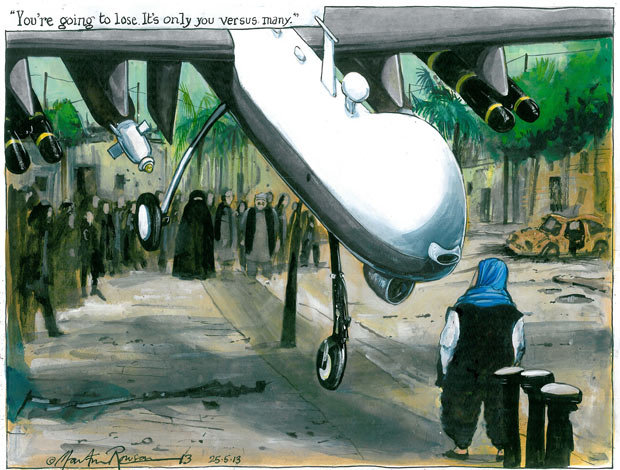
Martin Rowson cartoon on the US drone debate, guardian.co.uk, Friday 24 May 2013 16.58 EDT, Source
Google advertising under investigation in US
US federal trade commission looking into allegations that company's DoubleClick has illegally promoted Google products
Charles Arthur, technology editor The Guardian, Friday 24 May 2013 15.20 EDT, Article Source
The US trade regulator is understood to be looking at whether DoubleClick is being used to muscle
clients into buying adverts on other Google advertising platforms. Photograph: Stephen Lam/ReutersThe US federal trade commission is investigating whether Google's DoubleClick advertising subsidiary has illegally pushed customers to buy its other products, the Guardian has established.
The regulator is understood to be looking at whether the display advertiser, acquired by Google in 2008 for $3.1bn (£2bn), is being used to muscle clients into buying adverts on other Google advertising properties such as its text-based AdSense. That could constitute "tying", which is illegal under antitrust law.
FTC spokesman Peter Kaplan declined to comment. The Guardian has, however, confirmed that the investigation is under way from other sources with knowledge of the FTC's work.
The FTC, which has a remit to protect consumers, has a number of preliminary investigations under way at any time, many of which are subsequently dropped for lack of evidence or harm. The first sign that it was moving towards a formal investigation would be the issuing of investigative requests to affected companies. The Google investigation is understood to be in its preliminary stages.
Reuters reported that the concerns have been raised by rivals who have complained that DoubleClick products such as its ad management system have been used to encourage sites to use other Google products such as AdExchange.
An antitrust investigation by the FTC could seriously hamper Google's freedom to manoeuvre in the advertising market. DoubleClick provides ad targeting based on various criteria. Since the purchase was completed in 2008, the number of players in the online ad market has shrunk.
Google had about 15% of America's $15bn online display advertising market in 2012, ahead of Facebook's 14.6%, said research firm eMarketer. That's expected to widen in Google's favour over the next year.
Microsoft famously fell foul of antitrust law in the 1990s, found guilty of illegally tying PC vendors' ability to buy its Windows operating system to the use of its Internet Explorer browser. That shut out the rival Netscape. Microsoft escaped a direct sanction following an appeal in 2000 but had to submit to antitrust oversight until May 2011. The trial and subsequent consent decree substantially changed Microsoft's corporate culture – and created the opportunity for Google to emerge with the rise of the internet.
Separately, the European commission has yet to decide whether it will accept a number of suggestions made by Google to end an investigation into potential abuse of its search monopoly. Google in April offered a number of concessions relating to search labelling – but rivals who previously complained to the EC indicated they would reject them, which could set back any agreement and might trigger legal action.
The FTC has carried out formal investigations against Google a number of times in recent years. In 2011 it investigated its Google Buzz social media system, for which it was bound over for 20 years in March 2011 on privacy-related matters. It then had to pay a $22.5m fine last August for violating that ruling by hacking Apple users' browsers to track them online.
In January, the FTC cleared Google of biasing its search results in its own favour after a two-year formal investigation that ran in parallel with – but separate from – the one in Europe. However, the FTC did slap down Google's Motorola Mobility (MMI) subsidiary for its attempts to seek injunctions against companies including Apple and Motorola for using its "standards-essential" patents – a decision seen by many as lowering MMI's overall value, because it reduced the amount that Google could demand for use of its portfolio of 17,500 patents.
That weakness in MMI's patent portfolio was reinforced on Thursday, when a panel at the ITC, which adjudicates on trade disputes over US imports, declined to grant MMI a sales ban against Microsoft's Xbox, ending a dispute that had gone on since November 2010.
Previously a US judge cut to just $1.8m an MMI claim under which it was demanding royalties on a standards-essential patent that would have cost Microsoft billions of dollars annually.
The US district court judge argued that having a patent with comparatively small functionality used in a standard should not be an excuse for demanding a "hold-up" rate.
In Europe, Apple and Microsoft have both complained to the EC's antitrust arm – the same one investigating Google's alleged search bias – about MMI's use of standards-essential patents to seek injunctions.
Keith Lampe ~ Co-Founder of YIPPIE and Progressive Activist Groups + Video Channel
March Against Monsanto ~ May 25, 2013
On May 25, activists around the world will unite to March Against Monsanto.
Why do we march?
Research studies have shown that Monsanto’s genetically-modified foods can lead to serious health conditions such as the development of cancer tumors, infertility and birth defects.
In the United States, the FDA, the agency tasked with ensuring food safety for the population, is steered by ex-Monsanto executives, and we feel that’s a questionable conflict of interests and explains the lack of government-lead research on the long-term effects of GMO products.
Recently, the U.S. Congress and president collectively passed the nicknamed “Monsanto Protection Act” that, among other things, bans courts from halting the sale of Monsanto’s genetically-modified seeds.
For too long, Monsanto has been the benefactor of corporate subsidies and political favoritism. Organic and small farmers suffer losses while Monsanto continues to forge its monopoly over the world’s food supply, including exclusive patenting rights over seeds and genetic makeup.
Monsanto’s GMO seeds are harmful to the environment; for example, scientists have indicated they have caused colony collapse among the world’s bee population.
What are solutions we advocate?
Voting with your dollar by buying organic and boycotting Monsanto-owned companies that use GMOs in their products.
Labeling of GMOs so that consumers can make those informed decisions easier.
Repealing relevant provisions of the US’s “Monsanto Protection Act.”
Calling for further scientific research on the health effects of GMOs.
Holding Monsanto executives and Monsanto-supporting politicians accountable through direct communication, grassroots journalism, social media, etc.
Continuing to inform the public about Monsanto’s secrets.Taking to the streets to show the world and Monsanto that we won’t take these injustices quietly.
We will not stand for cronyism. We will not stand for poison.
That’s why we March Against Monsanto.
Join us! http://on.fb.me/ZUxe3o
Find cities already participating: http://bit.ly/ZTDsk8
Start your own: http://on.fb.me/16qw2r4
Google faces new federal antitrust probe
via Reuters, Article Source
WASHINGTON (Reuters) - U.S. regulators are in the early stages of an antitrust probe into whether Google Inc, the top player in web display advertising, breaks antitrust law in how it handles some ad sales, a source told Reuters on Thursday.
The source said that it was unlikely that the Federal Trade Commission had sent out civil investigative demands in relation to the probe, which would be the sign of a formal and more serious investigation.
The new line of inquiry focuses on tools acquired when Google bought display ad company Doubleclick in 2007; other firms which specialize in helping web publishers sell ads to put on their websites are complaining to the FTC, the source said.
According to a second source familiar with the situation, Google has not been notified of any antitrust investigation so far. Google and the Federal Trade Commission declined comment on the matter.
The sources did not want to be named in order to protect their business relationships.
The FTC wrapped up its earlier investigation into Google just four months ago, concluding that the search giant had not manipulated its Web search results to hurt rivals.
Google was the number one player in the $15 billion U.S. display ad market in 2012, with 15.1 percent market share, compared to Facebook's 14.6 percent share, according to industry research firm eMarketer. Google is expected to widen its lead to 20.7 percent of the market in 2014.
Google is currently trying to convince European antitrust investigators to wrap up a separate antitrust probe, and has offered to change some search pages to give more space to rivals in order to satisfy their concerns.
In that case, Google is accused of hiding links to rival shopping, travel and other websites to protect its ad revenues. On April 11, it said it would offer consumers links to three rival sites in some searches and would label its products.
(Reporting by Diane Bartz in Washington, additional reporting by Alexei Oreskovic in San Francisco, editing by Ros Krasny and Phil Berlowitz)
Marijuana tied to better blood sugar control
By Genevra Pittman, Reuters, Article Source
NEW YORK (Reuters Health) - People who had used marijuana in the past month had smaller waists and lower levels of insulin resistance - a diabetes precursor - than those who never tried the drug, in a new study.
The findings, based on surveys and blood tests of about 4,700 U.S. adults, aren't enough to prove marijuana keeps users thin or wards off disease. And among current pot smokers, higher amounts of marijuana use weren't linked to any added health benefits, researchers reported in The American Journal of Medicine.
"These are preliminary findings," said Dr. Murray Mittleman, who worked on the study at Beth Israel Deaconess Medical Center in Boston.
"It looks like there may be some favorable effects on blood sugar control, however a lot more needs to be done to have definitive answers on the risks and potential benefits of marijuana usage."
Although pot smoking is a well-known cause of "the munchies," some previous studies have found marijuana users tend to weigh less than other people, and one suggested they have a lower rate of diabetes. Trials in mice and rats hint that cannabis and cannabinoid receptors may influence metabolism.
The new study used data from a national health survey conducted in 2005-2010. Researchers asked people about drug and alcohol use, as well as other aspects of their health and lifestyle, and measured their insulin and blood sugar levels.
Just under 2,000 participants said they had used marijuana at some point, but not recently. Another 600 or so were current users - meaning they had smoked or otherwise consumed the drug in the past month.
Compared to people who had never used pot, current smokers had smaller waists: 36.9 inches versus 38.3 inches, on average. Current users also had a lower body mass index - a ratio of weight to height - than never-users.
When other health and lifestyle measures were taken into account, recent pot use was linked to 17 percent lower insulin resistance, indicating better blood sugar control, and slightly higher HDL ("good") cholesterol levels.
However, there was no difference in blood pressure or blood fats based on marijuana use, Mittleman's team found.
A CAUSAL LINK?
Mittleman said that in his mind, it's still "preliminary" to say marijuana is likely to be responsible for any diabetes-related health benefits.
"It's possible that people who choose to smoke marijuana have other characteristics that differ (from non-marijuana smokers)," and those characteristics are what ultimately affect blood sugar and waist size, he told Reuters Health.
Dr. Stephen Sidney from the Kaiser Permanente Division of Research in Oakland, California, said he wonders if cigarette smoking may partially explain the association. Marijuana users are also more likely to smoke tobacco, he told Reuters Health.
"People who use tobacco oftentimes tend to be thinner," said Sidney, who has studied marijuana use and weight but didn't participate in the new study. "So I really wonder about that."
Another limitation with this and other studies, Sidney and Mittleman agreed, is that all of the data were collected at the same time, so it's unclear whether marijuana smoking or changes in waist size and blood sugar came first.
"The question is, is the marijuana leading to the lower rate (of diabetes) or do they have something in common?" said Dr. Theodore Friedman, who has studied that issue at Charles R. Drew University of Medicine and Science in Los Angeles.
He and his colleagues think the link is probably causal. "But it's really hard to prove that," Friedman, who also wasn't involved in the new research, told Reuters Health.
One possibility is that the anti-inflammatory properties of marijuana help ward off diabetes, he said. But he agreed that more research is needed to draw out that link.
"I want to make it clear - I'm not advocating marijuana use to prevent diabetes," Friedman said. "It's only an association."
SOURCE: http://bit.ly/10Ty3La The American Journal of Medicine, online May 16, 2013.
Steven Leech ~ Writer/Poet/D.J.
Was a Story Set in Wilmington
Among the Earliest Influences on the
Literature of the Harlem Renaissance?by Steven Leech, Broken Turtle Blog, Article Source
Alice Dunbar-NelsonAmong the earliest literary figures who lived in Delaware in the early 20th century was Alice Dunbar-Nelson. She was born Alice Moore in New Orleans on July 19, 1875. Her first husband was the American poet Paul Laurence Dunbar who died in 1906, about three years after she moved to Wilmington where she had family. Probably the best and most recent example of her influence on Paul Laurence Dunbar and about their the stormy relationship can be found in Eleanor Alexander’s 2002 book Lyrics of Sunshine and Shadow (New York University Press). Her own literary career did not end there. Her literary work showed up, both before and after her marriage to Dunbar, in places like George Jean Nathan’s and H. L. Mencken’s Smart Set as well as in Crisis when it was edited by W. E. B. DuBois. While in Wilmington she married Robert Nelson and is better known today as Alice Dunbar-Nelson. Later she worked as an educator and social activist as well as publisher of the local African American newspaper, The Wilmington Advocate, during the early 1920s, making her a pioneer of local Black journalism. Her literary and journalistic works inspired many who participated in the Harlem Renaissance during the 1920s.
One of Dunbar-Nelson’s early short stories, “Hope Deferred,” is among her most anthologized. Two anthologies where the story can be found are: Ebony Rising: Short Fiction of the Greater Harlem Renaissance Era, edited by Craig Gable and published in 2004 by the Indiana University Press, and “Girl, Colored” and Other Stories: A Complete Short Fiction Anthology of African-American Women in The Crisis Magazine, 1910-2010, edited by Judith Musser and published in 2011 by McFarland & Company, Incorporated.
“Hope Deferred” was first published in 1914 in Crisis 8, the main publication for the National Association for the Advancement of Colored People (NAACP). The story was most certainly written in Wilmington and gives clues regarding its locale. Early on in the story, Dunbar-Nelson states that the city in the story is, “if not distinctly southern, at least one on the borderland between the North and the South.” Later on in the same story she divulges that the protagonist, Edwards, is serving time at the “county workhouse.” The “Workhouse,” during a little more than the first half of the 20th century in New Castle County, was the name given to the county penal institution then located at the intersection of Greenbank Road and the Newport-Gap Pike (Route 41) near Price’s Corner. The “Workhouse” was also the place from which an uncharged inmate, George White, was kidnapped by local white citizens and lynched nearby in 1903, the year that Alice Dunbar arrived in Wilmington. The “Workhouse” was also the location, where about two weeks before the lynching of George White, several men were publicly whipped and made to stand in the pillory. Delaware finally outlawed the pillory in 1905, but the state did not abolish corporal punishment until the late 1960s. One of the guard towers of the ‘Workhouse” still remains in the Park at Price’s Corner.
Alice Dunbar-Nelson wrote “Hope Deferred,” which is most probably set in Wilmington, at a time when the Dupont Company was about to make an obscene fortune from profits from World War I, when the United States occupied the impoverished country of Haiti, when the Ku Klux Klan in Delaware was at the height of its power and influence and when both major political parties heard racist views. Even though the Progressive Era was in full bloom in places like New York City, and the Modernist Movement was making significant cultural advances, hope seemed to be waning for Wilmington’s African-American community. It was a bleak time in Delaware to be writing for social and cultural progress. In spite of this, Dunbar-Nelson wrote a story that was echoed in a refrain attributed to Langston Hughes when “hope deferred” became transferred into a “dream deferred.”
Alice Dunbar-Nelson only has a small citation in Alain Locke’s monumental tome, The New Negro: Voices of the Harlem Renaissance, published in 1925. Perhaps she might have had a greater part in Locke’s anthology and commentary had she gone to Harlem and played a greater role in that flowering of modern African-American culture. She chose instead to remain in Wilmington, and in her later years in Philadelphia, writing and struggling for social progress. Alice Dunbar-Nelson died on September 18, 1935. She is interred at the Wilmington and Brandywine Cemetery.
Notes from ~@~
"A" is for Andrew's Apartment
by Ann Nichols, Open Salon, January 8, 2010 11:48AM, Article Source
As I may have mentioned a time or two, I fell in love with a different gay man every year of college. My second year at Oberlin, I fell in love with Andrew. Tall and solid, with bright blue eyes, a heart for literature, and a speaking voice that mingled seduction and the edge of an easy laugh, he was perfect for me. (Well, except for being gay and all). I met him in Shakespeare 301, where we noticed each other making comments as self-referential and pithy as only the comments of an undergraduate can be. When it was time to pick a partner to prepare a scene from Much Ado About Nothing, we were each other's Beatrice and Benedict as if it had been ordained by God, as if there was no one else in the classroom.
We fell into a pattern, Andrew and I, of meeting often for rehearsals, sitting together in Shakespeare class, and talking over coffee about everything from apartheid to heartbreak. Crunching over the fallen leaves, arm in arm, we walked together under the street lights to Professor Pierce's house the night of the Shakespeare performances. We sat together in the warm, comfortable living room where Mrs. Pierce, who was legally blind, brought in coffee and cookies for us, and Professor Pierce raised the invisible curtain on our night of theater, acknowledging our nerves and reminding us that The Bard was best understood in flesh and blood and not from the printed page. When it was our turn, Andrew and I bantered, flirted and sparked the hell out of our scene, and walked back to campus flushed and galvanized by applause and relief. We stopped for coffee at The Campus Diner, and as he talked, I was distracted by the blueness of his eyes, and the way our knees kept touching under the table. Beatrice was in love with her Benedict, although Benedict was still pining over some guy named Evan who he'd met on a work trip over the summer.
Eventually, Andrew invited me to his apartment to study for finals. I knew that he lived up over The Tap House, a bar as dive-y as it could be in a town that permitted the sale of nothing more potent than "near beer." A place where the most daring undergraduates mingled with the "townies," who inexplicably chose not to drive to a real bar outside of town to drink real alcohol, but came into Oberlin to drink steins of weak, vile near beer and menace the Elvis Costello wannabes. Clear as I could be about the fact that Andrew was absolutely and irrevocable gay, I still wanted to be near him, and to see the place where he lived. Conversions happened, I had heard, and how would I ever know if I didn't try?
I knew that he lived with a small colony of the people who most fascinated and terrified me at Oberlin, the heavily ironic, black-wearing chain smokers of unfiltered Camels who tended to major in Studio Art, Art History and English, and to originate from the Island of Manhattan. Although I had frequent contact with them in class, worked with them at the college radio station, and washed their plates of soft-boiled eggs garnished with cigarette butts in the dish room, they did not speak to me or in any way acknowledge my existence. No matter how hard I tried, with my used mens' overcoat my pointy-toed black plastic boots from Trash & Vaudeville, and my asymmetrical 80s haircut, they could smell my fundamentally Midwestern, goody-two-shoes aroma. They could tell, from passing me on the stairs in the library, that I had a drawer filled with Fair Isle sweaters, that I listened to The Pointer Sisters instead of The Butthole Surfers, that I secretly preferred Louisa May Alcott to Camus. I was Doris Day among Patti Smiths. I was terrified by them, I wanted to be them, and I harbored a fantasy that if I could just get my foot in the door, literally and figuratively, they would admire my wit and intelligence and admit me to the inner circle. If Andrew could get in, I reasoned, so might I.
The afternoon I first pushed the buzzer next to the Taproom's front doors, I was quickly admitted, and trudged up the long flight of malodorous stairs and into the kitchen. Like a scene from Twilight, I came upon a tableau of extraordinarily pale, beautiful people wearing black clothes, and surrounded by piles of books and half-filled coffee cups. (I do not know whether they got all sparkly when they were outside in the sun; I never saw one of them outside in daylight). Although Andrew, standing near the table, greeted me with a warm hug and announced me to his roommates, they barely acknowledged me; I think there was a bloodless, half-raised hand from one neurasthenic guy in a CBGBs T-shirt. Andrew offered me a cup of coffee, and as he poured it into a chipped mug, a girl burst into the room. Less beautiful than the others, but expensively clad in a pleated black schoolgirl skirt, vintage beaded cardigan and flat suede boots, she was clearly hysterical. "My mouton!" she said as she rubbed her hands in her black curls, "somebody stole my fucking mouton!"
This news was greeted with as much interest as my earlier arrival, which is to say, none. I stepped closer to Andrew, mild panic trumping my desire to mingle with the It-crowd, and he leaned down and whispered into my ear that they were all "speeding," and had been awake and seated at the table for more than 36 hours. "We'll help you look," Andrew said to the frantic girl, "Amy, this is my friend Ann, Ann, this is Amy Rutledge." Oh. I knew who she was, by reputation; her father was a famous writer, she had lots of money, and reportedly returned to Oberlin from Manhattan after every vacation with a suitcase full of drugs and hard liquor.
"Hi" I ventured. She looked at Andrew.
"I had it here last night, I went to a party and I had it - no, maybe I didn't have it when I got home. Shit, if somebody took it at the party..." she started to cry. Not one person at the kitchen table raised so much as an eyebrow.
"Come on," Andrew said, taking her under one elbow, "we'll start in your room and look." I followed the into her bedroom, which looked rather as if someone reading literature at Oxford had subleased from a Parisian prostitute. All light fixtures were draped with scarves in various colors, the bed was a mess of silk sheets and tassled throw pillows, and the dresser mirror reflected bottles of Chanel, Givenchy and Joy. The floor was nearly covered with black garments, and since some were inside-out, I could see that they were mostly designer. Among the discarded finery were books, notebooks, typed pages, a small, framed oil painting of a somewhat abstract nude who appeared to be Amy, packages of Camels, and, in a corner near the window, a Chanel lipstick and a jar of stubby eye pencils. "What's a mouton? So we can help you look" asked Andrew as we stood near the doorway.
"It's a coat, it's lamb, it's black, and curly," Amy explained threading her way to the bed and sitting in tragic isolation. "It was my grandmother's. My dad is going to fucking kill me if I lost it." She pulled a beaded evening clutch from the space between her bed and the wall, and fished out a package of cigarettes and a lighter. "The label in it should say Bergdorf's" she added, lighting the smoke.
"Let's start to the right of the door and work around clockwise," Andrew said to me, holding my gaze for longer than necessary, telling me tacitly that he knew this was bizarre, but that it was okay. I would, at that moment, have looked for the mouton in a rat-infested sewer if he had asked me to. He knelt in the pile of clothes, and I joined him on the floor where we systematically examined pieces of clothing, and I resisted the strong urge to fold them, and to sort the fallen objects into tidy piles of books, garments and "other." I had a million questions. I wanted to know about the "speed,"how it worked, where they got it, why they liked it. I wanted to know if Amy was really their friend, and if she was, why didn't they care about her mouton? I wanted to know how Andrew had come to live with these people, and if he actually liked them, and if they were always like this, or only when they were "speeding." I worked in silence, wondering if this would be the only time I ever touched anything with a Stephen Sprouse label.
"Shit, I need an ashtray" Amy said from the bed, where she was still sitting. "Andrew?" she added, raising her voice at the end in a little-girl way at odds with the box of condoms I had just replaced beneath a copy of Atlas Shrugged.
"I'll be right back" he said to me, putting a large, warm hand on my shoulder as he raised himself from the floor. He left me there, and I returned to the hunt. It seemed unlikely that I would suddenly become visible to Amy, and that we would blossom into confidantes as I picked through her things.
"You're Andrew's friend?" she asked. She was staring out the window, ash falling onto her black skirt.
"Uhm, yes. I know him from Pierce's class." I had reached the bed, and thought I saw the edge of something that looked like dog fur. I lay flat on my stomach and wiggled my head and shoulders under the foot of the bed. I saw Andrew's large, work-booted feet moving towards the suede boots to my left, heard him say "here you go, sweetie," and her say "thanks, baby. You take such good care of me." Around my confined head were dust balls, lacy panties, an empty bowl with a spoon in it, and, beneath a pair of black jeans, the furry object. I eased my hand forward, grasped it, and pulled it towards me. It had a rounded collar, and a silk lining, and just beneath the collar an embroidered label, black on white, that read "Bergdorf's" in a flowing script.
"I got it!" I called out, beginning my cautious retreat from under the bed. I emerged, covered with dust, hair askew, holding the heavy jacket and giving it a shake to remove the worst of the detritus. It was really a lovely thing, a boxy 50s style with three-quarter sleeves and large black buttons adorned with sparkling centers. I held it out to Amy, who dropped the stub of her cigarette in the ashtray Andrew had brought her, sprung up and took the jacket into her arms.
"Thank you!!" she said, reaching out to pull me into a hug, crushed against the mouton. She smelled like smoke and roses. "Thank you Andrew's friend -" she cocked her head "what's your name again?"
"Ann."
"Thank you, thank you, you are my FAVORITE, favorite friend of Andrew's, thank you so much!" She let me go, and beamed at Andrew, looking prettier than she had thus far. "Thanks, doll," she said, winking at him. "You should invite her to a party here, or something. Shit!" She looked at the Cartier travel alarm next to her bed. "Shit, shit, shit I have to be writing the fucking Don Juan paper. Shit." She dropped the mouton on the bed and began rummaging through the books stored on the floor nearest the bed.
"You're welcome," I said as I followed Andrew out of the room, and into the relative calm and tidiness of his own.
I did not see Amy again, or any of the roommates, until the night of the "Come as Your Favorite Whore" party, but that is a story for another day.
Photo Credit:
Mouton Jacket: http://imagehost.vendio.com/a/35028292/aview/L655.jpg
The "Come As Your Favorite Whore" Party
by Ann Nichols, Open Salon, January 29, 2010 8:29AM, Article Source
Click to view Red pill and blue pill From Wikipedia, the free encyclopediaMy roommate in East Hall was a "townie" who had graduated at the top of her class from Oberlin High School, headed to a prestigious womens' college on the East coast, and transferred to Oberlin for reasons never entirely clear to me. Her family was conservative politically and socially, and reminded me of characters from a 1950s sitcom; her father with a flat top haircut and large glasses with black plastic frames, her mother in a dress or what could only be called "slacks," reading glasses on a chain around her neck, sensible shoes and no makeup. In the early 1980s her parents were a trope; going to their house for dinner was like turning a corner and finding oneself at the home of Aunt Bee's dowdy, bookish neighbors.
Betsy, their daughter, my roommate, was smart, and funny, and earnest. A good friend, a hard worker, a runner, she washed her face every night with Noxema and a washcloth, and returned to her half of the room smelling of eucalyptus and virtue. I knew she was a better person than I would ever be, and while part of me slipped easily into our domestic routine of breakfast together, dinner together, mutual respect for quiet study and Saturday nights eating blueberry whole wheat doughnuts from Gibson's and maybe drinking a little "near beer" at the Rathskeller, I sometimes longed for something darker. I often longed for something darker. I smoked, I pined for gay men, I bought every black, vintage garment I could afford, and still I knew that beneath it all I was really the same kind of nice girl in jeans and a Fair Isle sweater that Betsy was. I loved her, I really did, but I also had the need to make myself separate, as if she were my surrogate parent there in the cornfields of Ohio. Every good thing she did made me want, just a little, to drink straight gin until I threw up, and have sex with strangers, and smoke unfiltered Camels. Unfortunately, no one was offering me any of those options.
When Andrew invited me to the "Come As Your Favorite Whore" party at his apartment over the Taproom, I was ecstatic. Then terrified. We were in Modern American Novels, Andrew and I, and on my other side was Max, the guy who lived across the hall from me, a tall, lanky English Major type who would eventually become an artist of some reknown. Professor Gammon rustled papers at the podium, and I asked Andrew what one wore to such a party.
"Oh," he answered vaguely, "I don't really dress for it...lots of drag, the girls dress up in fishnets and heels...you know." I had no idea. Honestly, I did not have a favorite whore; I wasn't sure I had ever actually seen one, even when I lived in Boston. Sweetheart that he was, Andrew saw the panic in my face. "It's okay, doll; you'll figure it out. Borrow. Borrow from your roommate, and look at all your stuff. You'll find things." On my other side, Max snorted.
"Her roommate is, like, the dullest person in the entire world." He said as Gammon cleared his throat. Half of my brain was on the lecture, he was talking about A Modern Instance by William Dean Howells, I was thinking about my clothes, what I owned that could be worn by a whore, what did whores wear, was Betsy really that boring, if she was really that boring, did people like Max think I was just like her, but no, because if he thought that he wouldn't have said she was boring in front of me, so clearly, CLEARLY he was saying that she was dull but I was not, and that felt so good that I warmed, and then so bad and disloyal that I felt a stone grow in my stomach. I loved her, I loved the cozy, safe warmth and predictability of having a best friend living in the other half of my room. Couldn't I also have fishnets, and gin?
The night of the Come As Your Favorite Whore party was cold and windy. I had cobbled together an outfit which included a black skirt rolled at the top to make it short, a black cardigan unbuttoned low enough to show cleavage, and black tights with a couple of holes in them. I didn't have high heels, and could not have walked across the cobbled Quad in them anyway, so I wore black flats. I had dangly earrings, teased hair and what I believed to be a whorish jangle of makeup bought cheap at the Ben Franklin - red lips, blue eyelids, glittery pink cheeks. Betsy, about to be abandoned by me on a Saturday night, helped me get ready. I noticed that she looked bemused as she cut a little hole in my stocking, and tried to hide the giant bulge at my waist caused by rolling the top of the skirt. Maybe I was my favorite pregnant whore. I was mostly terrified; I had not been back to Andrew's apartment since the day in the fall when I had met Amy and found her mouton jacket. He said she had specifically told him to invite me. I could not imagine what this party would entail, and if I would know what to do. I chain smoked which, oddly, Betsy didn't mind; her father was a smoker and she said it reminded her of home.
With my vintage tweed overcoat over my whore ensemble, I left the safe plastic lounge chairs and carpeted halls of East, and headed across the Quad into town, to the Taproom. I could hear it from the street, and I could see silhouetted in the second floor windows, bodies moving. Walking, dancing, bottles in hands. I had very little experience with parties; I had avoided them in high school, there hadn't been any during my brief tenure at the Conservatory. At Oberlin I had hung out with groups in dorm rooms or lounges, but I had never been to a party off campus, and certainly not with the Persons in Black, who wielded all psychic power in my 20-year-old universe. I pushed the buzzer, and was allowed in. I smelled smoke, beer, perfume, sweat, wet wool, burnt coffee, and old books; as I climbed the stairs, I heard music I didn't know, loud, percussive, a singer with a flat, nasal voice. At the top of the stairs there were people everywhere, seemingly impenetrable, and I could not see a face that I knew. No Andrew, no Amy, not even any of the roommates. I started to push my way in between a tall, beautiful man in drag, and a small, pale girl wearing what seemed to be a bikini and white vinyl boots. I stepped on her foot.
"Ouch!" she said, both of them looking at me as if I had only recently been removed from the bottom of a shoe. "Fucking look where you're going."
"Sorry," I mumbled. This was not a good start, not a good start, not a good start. To my right I saw a guy I knew from the radio station, not a friend, exactly, he being a spinner of Social Distortion and Circle Jerks, and I being a spinner of Mozart, but he knew who I was. He sat in a large armchair with a Sherlock Holmes pipe in his hand, not in costume as far as I could tell; on his lap was a famous Person in Black, granddaughter of a prominent art gallery owner in Manhattan. She had a flapper bob with straight bangs and a fluff of black curls breaking out at the end of a smooth curve of hair, her skin was bloodless pale, her eyes heavily rimmed with black and her lips filled in with matte burgundy. She wore fishnets and impossibly high heels, and a small, tight black dress with no sleeves and a neck that plunged down and was gathered around a metal ring between her breasts. She was staring into space, and did not look at me, still wearing my coat, as I approached. "Nick," I said, "have you seen Andrew?" He looked at me and squinted, as if focusing.
"Andrew....?"
"Andrew who lives here. He invited me, I can't find him, I don't know anybody here, and-"
"Haven't seen him." He took a puff from his pipe and buried his face in the black curls. Dismissed, I looked around, wishing desperately that I could move away from Nick and his lady friend after having been completely and totally snubbed, but unwilling to give up my inch of floor space until I had a clear plan. Finally, finally I saw Andrew at the kitchen table, talking to Amy. I maneuvered across the room, bumping into arms and bodies when I looked down to avoid stepping on feet. When I got close enough, Andrew could see me, and beckoned me over.
"Annie!" he was genuinely delighted. "Let's put your coat in my room." I followed him; the sea of black, patchouli-scented cigarette puffers parted for him as it had not done for me. An arch of irony formed. In his room, I took off my coat and modeled my attempt at whoreishness. He smiled, benevolent as always. "You look absolutely cheap" he pronounced. "Let's get you a drink." I followed him back out into the party, silently pleading with him not to leave me, don't leave me, don't leave me, don't leave me. The kitchen table was set up as a bar, covered with bottles of vodka, gin, mostly clear things, littered with plastic cups, and featuring a large, clear glass bowl filled half way with a variety of pills. They were quite beautiful, actually, like candy. in the corner was a keg, and sitting in a chair at the table was Amy, resplendent in a too-tight, bright blue dress with sequins and matching eyeshadow. "Amy, you remember Annie, right?" Andrew asked, gesturing to indicate that I should pick something to drink.
"Uhm, vodka and orange juice would be good" I said, smiling at Amy. We did, after all, have a bond; I was her "favorite friend of Andrew's."
"Why'd he come to my fucking party if he was bringing her, piece of shit fucker" she mumbled into her hand. I looked at Andrew, alarmed.
"The guy she likes came with his girlfriend" he explained. "Amy, baby, come with us and see who's here" he tried, touching her bare, pink arm. Tears started to run down her cheeks, carrying with them a black trail of mascara.
"You're always so nice to me, always so nice." She stood, wobbling on pointy-toed black heels, and stepped towards Andrew. "You too," she said, finally looking at me, "you're so nice too. You're Andrew's friend. and you are soooooo nice to me. Why did he bring her, mother fucking sonofabitch?" There really wasn't an answer to this; I stood by Andrew, he held Amy, Persons in Black, in drag, in fishnets, in clouds of smoke, broke around us like waves as they moved in for another drink, or to fish a pill out of the bowl. No one spoke to us, even the roommates, who appeared to pull another bottle out of a cupboard or pitch a few discarded cups into the trash; they smiled at Andrew, he smiled back, he kept patting Amy's sequined back like he was burping a baby. I wasn't really sure this was fun, I was pretty sure it wasn't, I was under-dressed, anonymous, sad for Amy, thinking I would like either to get out and go back to my room or be drunk enough that it all seemed normal. I took a long drink of my vodka and made a second cup full.
"Can we do something for her?" I whispered to Andrew. He shook his head. He reconsidered.
"Her sister's here, somewhere - if you can find her, maybe we can get her into bed."
"How will I know which one is her sister?"
"She's wearing a fur coat, a long one, with a black dress under it and black boots. Her name is Patty." I noticed the black smudges on the front of his white button down shirt. Andrew was not dressed as his favorite whore; he was dressed as a tax accountant on a Saturday.
Back in the throng, I looked for a fur coat; it seemed that every time I was in that apartment I was looking for fur. I saw more men in drag than I had ever seen, noticing, absently that many of the men were far prettier than the women. It occurred to me that all of these people seemed to have, at their disposal, complete and upscale wardrobes of hooker-wear. I did not know a single person who owned fishnet stockings, a sequined dress or white vinyl boots. I was pretty sure I didn't know a man who owned womens' clothes, much less a whore outfit, but I didn't know for sure. It was too much, too fast; wasn't there middle ground between Betsy's Noxema and these arch, privileged aliens?
I saw a flash of brown fur and pursued it, pivoting sideways when I need to get though a tiny opening in the crowd. I was getting better at it. The wearer of the coat fit Andrew's description, and resembled Amy on a smaller, more slender scale. She was standing with her back to the wall, with a tall, nice looking guy in checkered slide-on shoes leaning down towards her. "Patty?" I said. She looked over, clearly annoyed.
"Yeah?"
"Um, I'm a friend of Andrew's, and he said to find you because Amy's having kind of a bad time." She rolled her eyes.
"And Amy is not having a bad time exactly when....?" She took the cardigan-ed arm of the tall guy. "I'll be back." She turned towards me, turned back to him, grabbed the front of his sweater with both hands and pulled him down for a kiss. I willed myself invisible. "Okay," she sighed, stepping away from him as he wiped his mouth with the back of his hand, "where is she?" I led her into the kitchen, where Amy was back in a chair, a cup in her hand. "What's the problem?" Patty asked Andrew.
"Paul's here. He brought his girlfriend." She rolled her eyes again.
"Jesus fucking Christ. He doesn't even really like her, either; he's in love with Michael Porter." She squatted in front of Amy until their eyes were level. "Amy, babes, you've got to stop drinking. You know you can't drink with the meds. I don't want to have to tell Daddy again." Amy looked away like a baby avoiding a spoon full of Gerber squash. "You don't want to have to go home, do you?" Amy turned her face back.
"No, but I'm so fucking sad, he brought that girl."
"I know, babes, I know...what's in that cup?"
"Water" answered Andrew. "We made a deal that she could have a real drink in a bit if she just had water for now." He winked at Patty, barely perceptible.
"K. Let's get her into bed." Patty rose and walked to one side of Amy, Andrew to the other. Amy smiled at me as they took her arms, licking a gray tear from the corner of her lip.
"Where'r my manners. You want something?" She nodded towards the bowl of pills, "I like the blue ones. Have a blue one." They were raising her, gently, and she turned back to me as they led her from the room. "You found my mouton!" I smiled at her, feeling wet heat stinging the back of my eyeballs.
"I'll be right back," Andrew told me, as they walked her, slowly, down the hall towards her room. I was an island as they swirled around me, all of the cool people, only briefly deterred by my inexplicable presence between their lithe, ironic selves and the bottles and pills on the table. I wondered, briefly, what a blue one would do for me. Andrew came back, looking tired. "I'm so, so sorry" he said, "she just takes things really hard."
"Is she okay now?" He smiled at me, his eyes so blue, with crinkles at the corners, like everything good in the world. I loved him so much, I was so terribly sad that he was gay, I felt terrible about Amy, I wanted to go home.
"She'll be all right. We've done this before. Patty put a fan on in her room so the noise isn't as bad, and she's sitting in there for a little while." I nodded.
"Andrew, thanks so much for inviting me, but I think I've got to go back to the dorm." He made a funny, crumple-lipped face that conveyed regret, but no surprise.
"I'll get your coat. Hang on." Alone in the room, waiting, I stepped towards the bowl of pills and put my hand in, enjoying the feeling of the tablets and capsules under my sweaty palm, between my spread fingers. Between my thumb and forefinger I grasped a blue pill, and held it as Andrew came out with my coat, helped me into it, and kissed me on the cheek. I slipped the pill into my pocket and threaded my way out of the kitchen, down the stairs, and out into the dark, cold and empty street.
Photo Credit
Blue Pill: http://www.flyingsnail.com/Dahbud/images/bluepill.jpg
Pussy Riot member begins hunger strike
Maria Alyokhina starts protest after being refused permission to attend parole hearing
Miriam Elder in Moscow, guardian.co.uk, Wednesday 22 May 2013 09.05 EDT, Article Source
The Pussy Riot member Maria Alyokhina in court in Moscow last year, where she was
sentenced to two years in prison. Photograph: Natalia Kolesnikova/AFP/Getty ImagesA jailed member of the anti-Kremlin punk band Pussy Riot has begun a hunger strike to protest at a court decision to refuse her permission to attend her own parole hearing.
Maria Alyokhina, 24, also forbade her lawyers from further representing her during the parole hearing, becoming the most high-profile prisoner to reject taking part in a justice system widely criticised as absurd.
A regional court in Berezniki, a small city in the Urals region of Perm where Alyokhina's prison colony is situated, had denied the activist the right to appear at her parole hearing on Wednesday. She appeared via videolink, and was required to file all motions by fax, requiring regular breaks in the hearing.
At the end of the day-long hearing, she announced she would start a hunger strike. The parole hearing was due to continue on Thursday.
"Let the troika sitting here -- the judge, the prosecutor and the colony employee -- decide my fate," Alyokhina said at the close of Wednesday's proceedings, referring to the Soviet-era three-person commissions that issued sentences to perceived enemies without a trial.
Alyokhina and two of her bandmates, Nadezhda Tolokonnikova and Yekaterina Samutsevich, were sentenced to two years in prison last year after being found guilty of "hooliganism motivated by religious hatred" for performing a punk anthem criticising Vladimir Putin inside a Moscow cathedral.
Samutsevich's sentence was later suspended. Tolokonnikova was denied parole last month. She and Alyokhina are due to be released in March next year.
In a recent letter to Radio Svoboda, Alyokhina wrote: "Soon I'll appear before the parole commission which, of course, will decide that it's impossible to let such a dangerous person as myself out into society. This is all boring and predictable."
The case against Pussy Riot signalled the start of a widespread crackdown on the anti-Putin opposition, and boosted the profile of the powerful Russian Orthodox church.
On Tuesday, the Duma approved a bill that would impose jail terms for "offending religious feelings". It must now pass a formal third reading and be signed into law by Putin. Critics fear it will add to the arsenal of new laws being used to crack down on dissent.
Paul McCartney writes to Russian leaders
over treatment of Pussy RiotFormer Beatle lauds country's 'great tradition of fair-mindedness' in handwritten letters pleading for the release of jailed band members
Dan Martin, guardian.co.uk, Thursday 23 May 2013 05.57 EDT, Article Source
We can work it out ... Paul McCartney performs in Orlando, US, on 18 May, during
the first US concert of his Out There tour. Photograph: John Raoux/APPaul McCartney has protested to the Russian government about the treatment of the members of Pussy Riot, after it emerged Maria Alyokhina has gone on hunger strike in prison after being refused the right to attend her own parole hearing.
Now McCartney has written to Russian officials, urging them to reconsider the jailing of Alyokhina and bandmate Nadezhda Tolokonnikova, asking them to remember the country's "great tradition of fair-mindedness". In the letter concerning Alyokhina, McCartney writes: "My personal belief is that further incarceration for Maria will be harmful for her and the situation as a whole, which, of course, is being watched by people all over the world. In the great tradition of fair-mindedness which the Russian people (many of whom are my friends) are famous for, I believe that you granting this request would send a very positive message to all the people who have followed this case."
In a separate letter regarding Tolokonnikova, who last month was denied parole, he writes: "I have had a long relationship with the Russian people, and, with this in mind, I am making the following request in a spirit of friendship for my many Russian acquaintances who, like me, believe in treating people -- all people -- with compassion and kindness."
Tolokonnikova and Alyokhina were jailed for two years in August 2012 for breach of the public order motivated by religious hatred after staging their now infamous "punk prayer" protest against Vladimir Putin in Moscow's Cathedral of Christ the Saviour in February 2012. A third woman, Yekaterina Samutsevich, was released last October after being given a suspended sentence.
Facebook's violently sexist pages
are an opportunity for feministsFacebook both reflects our misogynistic society and is a conduit to change it -- through campaigns such as Twitter's #FBrape
[Ed Note: This article makes one wonder about Mark Zuckerberg's mindset.]
Emer O'Toole, guardian.co.uk, Thursday 23 May 2013 07.00 EDT, Article Source
'In spite of complaint after complaint, Facebook continues to deem content encouraging
violence against women inoffensive.' Photograph: dpa picture alliance/Alamy
There's all sorts of stuff wrong with capitalism, but one thing I'd miss if I woke up in an economic utopia tomorrow is a good boycott. Offended by something racist, homophobic, classist or sexist about a company's product or advertising? Boycott. Tell the company why you're boycotting. Encourage others to boycott. If enough people agree with you, companies change the way they behave. Yay! If only there were as straightforward a way to react to ALL the racist, homophobic, classist, sexist arsery one encounters daily. But it's hard to boycott society (though God knows there are times I try).
Then there's Facebook. Facebook is a special case. On the one hand, it's a profit-driven corporation, but on the other, it's a corporation that makes its profits through provision of a platform for people's interests, beliefs and social habits. And when it stops being that platform, it stops making money. Sadly, we live in a society in which many people are interested in rape jokes, believe violence against women is funny and habitually consume cultural products that depict women as glossy sex things. And so, Facebook is full of pages and groups that graphically depict and explicitly condone violence against women.
As Tuesday's open letter to Facebook on behalf of more than 65 gender equality groups points out, Facebook routinely removes content that is violently racist, homophobic or Islamophobic. The company -- quite rightly -- would ban a group that showed two gay people lying unconscious at the bottom of the stairs with a caption like, "Next time, don't hold hands". While it'll approve content that condones tying women up and raping them, it certainly wouldn't tolerate an equally "humorous" page that riffed on the lynching of black people.
In spite of complaint after complaint, Facebook continues to deem content encouraging violence against women inoffensive. When journalists publicise a particularly indefensible page (usually a page that Facebook has already been made aware of by users), the company tends to act by shutting down that particular page. Without protocols in place to combat gender hate speech, however, this is pointless.
The question that arises is why Facebook continues to allow this kind of content to be published. It emits unconvincing chirps about being anti-censorship, but trips itself up by moderating, as pornographic, images of women breastfeeding, or body-positive pictures of post-mastectomy female torsos. This blogpost cuts wittily to the heart of the issue. The author lifts a typical porny pic from another Facebook page, Photoshops in a smattering of pubic hair, and posts it to her own group. Result? Overnight decision -- a 30-day ban.
So, the censorship explanation falls flat as a beautifully tattooed post-mastectomy chest, and the question remains: why is Facebook so committed to supporting gender hate speech? One possible explanation is that its company culture has naturalised sexist norms to the point where its members truly believe, along with the creators and users of pages such as Raping Your Girlfriend, that violently misogynistic content is acceptable and funny. At base, there's little difference between classing these pages as inoffensive humour and saying: "Lighten up babe -- some women can take a joke. Do you know what would sort you out? A good raping -- ha ha."
But Facebook has a brand and has money to make. The #FBrape Twitter campaign is hitting where it hurts, by tweeting big advertisers with screengrabs of their carefully cultivated logos floating alongside pages entitled things such as What's 10 Inches Long and Makes Girls Have Sex With Me -- My Knife! So far, many companies have responded quickly and publicly by condemning the content and complaining to Facebook about it. According to Laura Bates of Everyday Sexism, the #FBrape campaign's next challenge must be making these advertisers aware of the history of this issue -- of how policy change, rather than moderation of publicised, isolated incidents -- is needed.
The #FBrape campaign holds a mirror up to a pervasive element of our culture that many either fail to acknowledge or aggressively insist that feminists laugh off. Officially, violent misogyny is not condoned, and most corporations won't endanger their brands by being associated with it. Unofficially, violent misogyny is still very much de rigueur. Facebook is a conduit between these official and unofficial attitudes to women and, as such, provides an opportunity for radical intervention. Paradoxically, as a profit-driven organisation that must reflect the values of our sexist society, Facebook offers gender activists a vital chance to confront, contest and change permissive attitudes to violence against women.
Keystone pipeline: House votes to
bypass Obama for approvalRepresentatives approve bill declaring that controversial oil pipeline from Canada does not need president's permission
[Ed. Note: Voters should be asking how much money House Representative Members received from BIG OIL to approve this bill; remembering ... Congress has an approval rating lower than the percentage of rat feces tolerated by the FDA in United States food supply.]
Suzanne Goldenberg, US environment correspondent, guardian.co.uk, 23 May 2013 01.20 EDT, Article Source
Part of the route for the Keystone pipeline in Nebraska. Photograph: Nati Harnik/APCongress has voted to shut Barack Obama out of the biggest environmental decision of his presidency -- the fate of the Keystone XL tar sands pipeline -- and claimed the authority to approve the project.
The vote to approve the pipeline, which passed 241-175 in the Republican-controlled house, was pure political theatre.
The measure would dispense with additional environmental reviews of the pipeline and would allow only 60 days for legal challenges.
The bill was unlikely to pass in the Senate and the White House said on Tuesday it would veto any measure that attempted to bypass the current permit process.
But the vote -- the seventh time Republicans in Congress have voted to speed up or approve Keystone -- keeps up the pressure on Obama to approve the project.
It also gave Republicans an opening to opine about high prices at the pump ahead of the Memorial Day holiday, when many people go away for the weekend.
All but one Republican member of Congress voted in favour of the bill. In several hours of debate Republicans lined up to berate the Obama administration for taking so long to render a decision on the pipeline.
"Five years! Five years and still no decision. What does five years mean? Well, world war two, where we mobilised America," Ted Poe, a Texas congressman, said from the house floor on Wednesday.
"We went off to war in less than five years. But yet we can't get a decision out of the White House for more than five years on this project. Are you kidding me?"
Supporters of the pipeline claim it will create jobs and help America become more energy independent.
Environmental campaigners have framed the decision on the Keystone as a test of Obama's commitment to act on climate change and live up to the bold promises he made at the start of his second term.
Crude from the Alberta tar sands is far more carbon intensive than conventional oils. Canadian scientists warned earlier this month that expanding production from the tar sands would lock the planet on course for catastrophic climate change.
But the White House has given no indication it will reject the project and Organising for Action, the grassroots group set up to support Obama's agenda, has pointedly stayed neutral on Keystone XL.
The Democratic party position on the pipeline has also been mixed.
Nineteen Democrats voted to cut Obama out of the decision and approve the pipeline. That was far fewer than the numbers that voted in favour of some of the Republicans' earlier Keystone bills and campaigners claimed it as a victory.
"Keystone proponents are losing momentum," Gene Karpinski, the president of the League of Conservation Voters, said in a statement. "The final decision remains right where it's been all along -- with President Obama."
Another Reason Why Bush Administration Baby Killers and the People Who Supported Them Should Be In Jail:
New light shed on US government's
extraordinary rendition programmeOnline project uncovers details of way in which CIA carried out kidnaps and secret detentions following September 11 attacks
• The Rendition Project interactive
• CIA rendition flights explainedIan Cobain and James Ball, guardian.co.uk, Wednesday 22 May 2013 07.01 EDT, Article Source
Guantánamo Bay, Cuba. Abu Faraj al-Libi, one of the detainees there, was allegedly
seized in Pakistan in 2005, flown to Afghanistan, switched to another aircraft
and taken to the US base via Romania. Photograph: Mark Wilson/GettyA groundbreaking research project has mapped the US government's global kidnap and secret detention programme, shedding unprecedented light on one of the most controversial secret operations of recent years.
The interactive online project – by two British universities and a legal charity – has uncovered new details of the way in which the so-called extraordinary rendition programme operated for years in the wake of the September 11 attacks, and the techniques used by the Central Intelligence Agency (CIA) to avoid detection in the face of growing public concern.
The Rendition Project website is intended to serve as a research tool that not only collates all the publicly available data about the programme, but can continue to be updated as further information comes to light.
Data already collated shows the full extent of the UK's logistical support for the programme: aircraft associated with rendition operations landed at British airports more than 1,600 times.
Although no detainees are known to have been aboard the aircraft while they were landing in the UK, the CIA was able to refuel during operations that involved some of the most notorious renditions of the post-September 11 years, including one in which two men were kidnapped in Sweden and flown to Egypt, where they suffered years of torture, and others that involved detainees being flown to and from a secret prison in Romania.
The database also tracks rendition flights into and out of Diego Garcia, in the Chagos Islands, and suggests that flight crews enjoyed rest-and-recreation stopovers on the Turks and Caicos Islands. Both are British overseas territories.
The Rendition Project is the result of three years of work, funded by the UK taxpayer through the Economic and Social Research Council, by Ruth Blakeley, a senior lecturer at the University of Kent, and Sam Raphael, a senior lecturer at Kingston University, working with Crofton Black, an investigator with the legal charity Reprieve.
"By bringing together a vast collection of documents and data, the Rendition Project publishes the most detailed picture to date of the scale, operation and evolution of the global system of rendition and secret detention in the so-called war on terror," said Blakeley.
Raphael said: "The database makes a major contribution to efforts to track CIA rendition flights, and provides the clearest picture so far of what was going on. It also serves as an important tool for investigators, journalists and lawyers to delve into in more detail."
Black added: "The Rendition Project lays bare the inner workings of the logistics network underlying the US government's secret prison programme. It's the most accurate and comprehensive resource so far published."
The data includes details on 11,006 flights by aeroplanes linked to the CIA's rendition programme since 2002. Of those, 1,556 flights are classed as confirmed or suspected rendition flights, or flagged as "suspicious", depending on the strength of the supporting evidence surrounding each.
The researchers have also confirmed 20 "dummy" flights within the data: flight paths logged with air traffic controllers, but never taken. Instead, the planes took a different route to different airports along the way, to pick up or drop off a detainee. About a dozen more flight paths are marked as possible dummy flights.
The website also weaves together first-hand testimony of detainees of their mistreatment within the secret prisons; the layout and conditions of the facilities; the movements of detainees across the globe; and documents that detail outsourcing to corporations that offered logistical support, from flights to catering and hotel reservations. In some cases, it is unclear whether the airline companies would have been aware of the purpose of the flights.
The project also brings to light new information on the methods used to avoid detection of rendition flights, particularly as journalists became aware of the programme. The project highlights "tarmac transfers" – occasions on which two planes involved in rendition met on remote airfields. The researchers believe these occasions were used to transfer detainees from one plane to another, making their rendition route far more difficult to track.
Among the prisoners who appear to have been switched from one aircraft to another in this way is Abu Faraj al-Libi, who is currently being held at the Guantánamo detention camp in Cuba. After being captured in Pakistan in May 2005, he appears to have been flown to Afghanistan, where he was switched to another aircraft and taken to Bucharest.
How to Perform a Citizen's Arrest
of A Bush Administration Officialby Nathan Robinson, July 27, 2008 05:22 PM, Article Source
The news that 4 people had been arrested in Iowa while trying to perform a citizen's arrest on Karl Rove got me wondering: Can we arrest Bush administration officials ourselves? So I slogged through a slew of state statutes, and as it turns out, the answer is yes. But only if you live in certain particular states.
Citizen's arrests have a long, rich tradition dating back hundreds of years. Because the power of ordinary people to help law enforcement execute its duties is important, nearly every state has some sort of statute on the books permitting citizen detentions of suspected criminals.
However, while most states allow citizen's arrests, the majority require the presence of the citizen performing the arrest during the crime. A number of states have more flexible language in their laws, though. The California Penal Code, for example says the following:837. A private person may arrest another:
1. For a public offense committed or attempted in his presence.
2. When the person arrested has committed a felony, although not in his presence.
3. When a felony has been in fact committed, and he has reasonable cause for believing the person arrested to have committed it.
Alabama and Kentucky have similar wordings. Montana phrases things thusly:
A private person may arrest another when there is probable cause to believe that the person is committing or has committed an offense and the existing circumstances require the person's immediate arrest.
The dispute here will likely arise over the definition of the words "require the person's immediate arrest." I'd argue that if anyone needed to be immediately arrested, it's Karl Rove, but a Montana judge might disagree. And one of the main downsides to citizen's arrests is that if you're in the wrong, you have almost no legal protection (and depending on state law, may have committed a crime tantamount to kidnapping).
Don't let that deter you, though! If there are reasonable grounds to suspect a felony has been committed by the person arrested, then a citizen's arrest is perfectly legally justified. Just don't go and arrest the man behind the counter at the sandwich shop who gave you the wrong change.
What the four Iowans did is courageous, and is exactly how we should use the citizen arrest power. A citizen's arrest is a peaceful, lawful, old-fashioned, and charmingly Midwestern way to hold government criminals accountable. I suggest that we start a nationwide movement. We will turn any suspected government criminals over to the police. Just wait until a Bush administration official shows up in your town.
Figure out whether they can reasonably be considered guilty of a felony. Check the US Code to see who's guilty of what, and then perform a citizen's arrest.
Rove, for example, could likely be detained on suspicion of obstruction of justice, having violated Title 1, Section 18, Chapter 73, S. 1505:
Whoever corruptly... obstructs, or impedes or endeavors to influence [or] obstruct...the due and proper exercise of the power of inquiry under which any inquiry or investigation is being had by either House, or any committee of either House or any joint committee of the Congress...[s]hall be fined under this title, imprisoned not more than 5 years or, if the offense involves international or domestic terrorism...imprisoned not more than 8 years, or both.
I would think that one's fairly cut-and-dry. I'm not a lawyer, however, and I don't know whether this would interfere with, or be superseded by, the pending contempt of Congress citation. Still, I think it gives plenty of "reasonable suspicion," and if Rove is in California, that's all you need. You might pick up Miers or Bolton as well with that statute.
It doesn't take much perusing of the U.S. Code to find violations that administration officials are surely guilty of (the Elections and Political Activities section is one particular goldmine), and if you live in a state with lax state laws regarding citizen's arrests, detaining these people is perfectly within your right. It's just important to follow a few key steps.
1. Check your state laws first. This can be done by entering the name of your state and "statutes" into a search engine. An official online copy of existing state law will usually be the first result. The process for citizen's arrests will usually be located in the section under Crimes > Criminal Procedures > Arrests > Arrests by Private Persons, or something similar. Sometimes statutes are incredibly confusing to navigate through, but there will often be a search function somewhere on the page.
2. Check to make sure the particular person in question can be suspected of committing a felony (make sure it's a felony, though this depends on state law also).
3. Detain the person, without using physical force of any sort. Announce that you are performing a citizen's arrest, and cite the crime they are suspected of.
4. Call the police. Make sure you know the relevant citizen's arrest statute number and the U.S. Code number. You don't want to be the one being arrested.
5. This is risky, and all depends on your state. Make sure you're on solid legal ground first. It is best to consult a lawyer. WikiHow has an informative article on citizen's arrests in general.
We really ought to be inspired by the 4 courageous Iowans who dared to try to hold Rove accountable for his crimes. Government officials, no matter how high-ranking, should be prevented from even walking the street without fear of arrest, if they are guilty of a crime. Whether or not justice is done should not depend on how politically influential the accused is. If the Justice Department will not do its job, then let citizens uphold the law. Citizen's arrests are a powerful yet peaceful way to show the strength and defiance of the American people.
Totally Disingenuous Politician Says What:
Aid is ‘totally different’ from Aid
Tweedle Flip and Tweedle FlopInhofe: Tornado aid ‘totally different’ from Hurricane Sandy aid
By Rachel Weiner and Matt DeLong, The Washington Post, May 21, 2013 at 10:40 am, Article Source
In the wake of the devastating tornado in an Oklahoma City suburb, Sen. James Inhofe (R-Okla.) rejected comparisons between federal aid for this disaster and the Hurricane Sandy relief package he voted against.
[Video located at Source]
That was a “totally different” situation, Inhofe told MSNBC, arguing that the Sandy aid was filled with pork. There were “things in the Virgin Islands. They were fixing roads there and putting roofs on houses in Washington, D.C.”
“Everyone was getting in and exploiting the tragedy that took place,” he said. “That won’t happen in Oklahoma.”
The senator appeared to be referring to the fact that some funds from the Sandy package for the Federal Highway Administration could go to the Virgin Islands, as well as $2 million allocated to the Smithsonian for roofs damaged by the storm. We don’t yet know what a congressional relief package for Oklahoma would look like, if one is even necessary. As of Tuesday morning, FEMA has $11.6 billion in its Disaster Relief Fund.
Sen. Tom Coburn (R-Okla.) has said that any federal aid to Oklahoma must be offset by cuts. Like Inhofe, he voted against the Hurricane Sandy package. Two of Oklahoma’s five members in the House of Representatives, all Republicans, voted against it. Rep. James Lankford voted for a smaller federal flood relief package but against the bigger package. President Obama has declared a federal disaster, and Federal Emergency Management Agency Director Craig Fugate is headed to Oklahoma.
Are Obama Scandals and Corporate Media Problems
Happening Because Bush Administration Baby Killers
Were Set Free and Not Charged With War Crimes?
Lies, Lies, Lies - BlackMustache.comIt is important to remember Democrats and Republicans supported Israel's murder and maiming of United States Naval personnel aboard the USS Liberty, supplied Iraq with biological and chemical weapons from U.S. manufacturers, appointed Bush president, passed the Patriot Act against U.S. citizens, gave Telecom companies a free pass for knowingly breaking law, and more than likely had something to do with the mass murders of 9/11.
Obama DOJ formally accuses journalist
in leak case of committing crimesYet another serious escalation of the Obama administration's attacks on press freedoms emerges
Glenn Greenwald, guardian.co.uk, Monday 20 May 2013 08.16 EDT, Article Source
Fox News chief Washington correspondent James Rosen had his emails read by the Obama DOJ,
which accused him of being a co-conspirator in a criminal leak case. Photo: screen grab(updated below - Update II)
It is now well known that the Obama justice department has prosecuted more government leakers under the 1917 Espionage Act than all prior administrations combined - in fact, double the number of all such prior prosecutions. But as last week's controversy over the DOJ's pursuit of the phone records of AP reporters illustrated, this obsessive fixation in defense of secrecy also targets, and severely damages, journalists specifically and the newsgathering process in general.
New revelations emerged yesterday in the Washington Post that are perhaps the most extreme yet when it comes to the DOJ's attacks on press freedoms. It involves the prosecution of State Department adviser Stephen Kim, a naturalized citizen from South Korea who was indicted in 2009 for allegedly telling Fox News' chief Washington correspondent, James Rosen, that US intelligence believed North Korea would respond to additional UN sanctions with more nuclear tests - something Rosen then reported. Kim did not obtain unauthorized access to classified information, nor steal documents, nor sell secrets, nor pass them to an enemy of the US. Instead, the DOJ alleges that he merely communicated this innocuous information to a journalist - something done every day in Washington - and, for that, this arms expert and long-time government employee faces more than a decade in prison for "espionage".
The focus of the Post's report yesterday is that the DOJ's surveillance of Rosen, the reporter, extended far beyond even what they did to AP reporters. The FBI tracked Rosen's movements in and out of the State Department, traced the timing of his calls, and - most amazingly - obtained a search warrant to read two days worth of his emails, as well as all of his emails with Kim. In this case, said the Post, "investigators did more than obtain telephone records of a working journalist suspected of receiving the secret material." It added that "court documents in the Kim case reveal how deeply investigators explored the private communications of a working journalist".
But what makes this revelation particularly disturbing is that the DOJ, in order to get this search warrant, insisted that not only Kim, but also Rosen - the journalist - committed serious crimes. The DOJ specifically argued that by encouraging his source to disclose classified information - something investigative journalists do every day - Rosen himself broke the law. Describing an affidavit from FBI agent Reginald Reyes filed by the DOJ, the Post reports [emphasis added]:
"Reyes wrote that there was evidence Rosen had broken the law, 'at the very least, either as an aider, abettor and/or co-conspirator'. That fact distinguishes his case from the probe of the AP, in which the news organization is not the likely target. Using italics for emphasis, Reyes explained how Rosen allegedly used a 'covert communications plan' and quoted from an e-mail exchange between Rosen and Kim that seems to describe a secret system for passing along information. . . . However, it remains an open question whether it's ever illegal, given the First Amendment's protection of press freedom, for a reporter to solicit information. No reporter, including Rosen, has been prosecuted for doing so."
Under US law, it is not illegal to publish classified information. That fact, along with the First Amendment's guarantee of press freedoms, is what has prevented the US government from ever prosecuting journalists for reporting on what the US government does in secret. This newfound theory of the Obama DOJ - that a journalist can be guilty of crimes for "soliciting" the disclosure of classified information - is a means for circumventing those safeguards and criminalizing the act of investigative journalism itself. These latest revelations show that this is not just a theory but one put into practice, as the Obama DOJ submitted court documents accusing a journalist of committing crimes by doing this.
That same "solicitation" theory, as the New York Times reported back in 2011, is the one the Obama DOJ has been using to justify its ongoing criminal investigation of WikiLeaks and Julian Assange: that because Assange solicited or encouraged Manning to leak classified information, the US government can "charge [Assange] as a conspirator in the leak, not just as a passive recipient of the documents who then published them." When that theory was first disclosed, I wrote that it would enable the criminalization of investigative journalism generally:
"Very rarely do investigative journalists merely act as passive recipients of classified information; secret government programs aren't typically reported because leaks just suddenly show up one day in the email box of a passive reporter. Journalists virtually always take affirmative steps to encourage its dissemination. They try to cajole leakers to turn over documents to verify their claims and consent to their publication. They call other sources to obtain confirmation and elaboration in the form of further leaks and documents. Jim Risen and Eric Lichtblau described how they granted anonymity to 'nearly a dozen current and former officials' to induce them to reveal information about Bush's NSA eavesdropping program. Dana Priest contacted numerous 'U.S. and foreign officials' to reveal the details of the CIA's 'black site' program. Both stories won Pulitzer Prizes and entailed numerous, active steps to cajole sources to reveal classified information for publication.
"In sum, investigative journalists routinely -- really, by definition -- do exactly that which the DOJ's new theory would seek to prove WikiLeaks did. To indict someone as a criminal 'conspirator' in a leak on the ground that they took steps to encourage the disclosures would be to criminalize investigative journalism every bit as much as charging Assange with 'espionage' for publishing classified information."
That's what always made the establishment media's silence (or even support) in the face of the criminal investigation of WikiLeaks so remarkable: it was so obvious from the start that the theories used there could easily be exploited to criminalize the acts of mainstream journalists. That's why James Goodale, the New York Times' general counsel during the paper's historic press freedom fights with the Nixon administration, has been warning that "the biggest challenge to the press today is the threatened prosecution of WikiLeaks, and it's absolutely frightening."
Indeed, as Harvard Law Professor Yochai Benkler noted recently in the New Republic, when the judge presiding over Manning's prosecution asked military lawyers if they would "have pressed the same charges if Manning had given the documents not to WikiLeaks but directly to the New York Times?", the prosecutor answered simply: "Yes, ma'am". It has long been clear that this WikiLeaks-as-criminals theory could and would be used to criminalize establishment media outlets which reported on that which the US government wanted concealed.
Now we know that the DOJ is doing exactly that: applying this theory to criminalize the acts of journalists who report on what the US government does in secret, even though there is no law that makes such reporting illegal and the First Amendment protects such conduct. Essentially accusing James Rosen of being an unindicted co-conspriator in these alleged crimes is a major escalation of the Obama DOJ's already dangerous attacks on press freedom.
It is virtually impossible at this point to overstate the threat posed by the Obama DOJ to press freedoms. Back in 2006, Bush Attorney General Alberto Gonzales triggered a major controversy when he said that the New York Times could be prosecuted for having revealed the Top Secret information that the NSA was eavesdropping on the communications of Americans without warrants. That was at the same time that right-wing demagogues such Bill Bennett were calling for the prosecution of the NYT reporters who reported on the NSA program, as well as the Washington Post's Dana Priest for having exposed the CIA black site network.
But despite those public threats, the Bush DOJ never went so far as to formally accuse journalists in court filings of committing crimes for reporting on classified information. Now the Obama DOJ has.
This week, the New Republic's Molly Redden describes what I've heard many times over the past several years: national security reporters have had their ability to engage in journalism severely impeded by the Obama DOJ's unprecedented attacks, and are operating in a climate of fear for both their sources and themselves. Redden quotes one of the nation's best reporters, the New Yorker's Jane Mayer, this way:
It's a huge impediment to reporting, and so chilling isn't quite strong enough, it's more like freezing the whole process into a standstill."
Redden says that "the DOJ's seizure of AP records will probably only exacerbate these problems." That's certainly true: as surveillance expert Julian Sanchez wrote in Mother Jones this week, there is ample evidence that the Obama DOJ's seizure of the phone records of journalists extends far beyond the AP case. Recall, as well, that the New York Times' Jim Risen is currently being pursued by the Obama DOJ, and conceivably faces prison if he refuses to reveal his source for a story he wrote about CIA incompetence in Iran. Said Risen:
I believe that the efforts to target me have continued under the Obama Administration, which has been aggressively investigating whistleblowers and reporters in a way that will have a chilling effect on the freedom of the press in the United States."
If even the most protected journalists - those who work for the largest media outlets - are being targeted in this way, and are saying over and over that the Obama DOJ is preventing basic news gathering from taking place without fear, imagine the effect this all has on independent journalists who are much more vulnerable.
There is simply no defense for this behavior. Obama defenders such as Andrew Sullivan claim that this is all more complicated than media outrage suggests because of a necessary "trade-off" between press freedoms and security. So do Obama defenders believe that George Bush and Richard Nixon - who never prosecuted leakers like this or formally accused journalists of being criminals for reporting classified information - were excessively protective of press freedoms and insufficiently devoted to safeguarding secrecy? To ask that question is to mock it. Obama has gone so far beyond what every recent prior president has done in bolstering secrecy and criminalizing whistleblowing and leaks.
Goodale, the New York Times' former general counsel, was interviewed by Democracy Now last week and said this:
AMY GOODMAN: "You say that President Obama is worse than President Nixon.
JAMES GOODALE: "Well, more precisely, I say that if in fact he goes ahead and prosecutes Julian Assange, he will pass Nixon. He's close to Nixon now. The AP example is a good example of something that Obama has done but Nixon never did. So I have him presently in second place, behind Nixon and ahead of Bush II. And he's moving up fast. . . ."Obama has classified, I think, seven million -- in one year, classified seven million documents. Everything is classified. So that would give the government the ability to control all its information on the theory that it's classified. And if anybody asks for it and gets it, they're complicit, and they're going to go to jail. So that criminalizes the process, and it means that the dissemination of information, which is inevitable, out of the classified sources of that information will be stopped.
JUAN GONZÁLEZ: "What about the--
JAMES GOODALE: "It's very dangerous. That's why I'm -- I get excited when I talk about it."
That was before it was known that the Obama DOJ read James Rosen's emails by formally labeling him in court an unindicted co-conspirator for the "crime" of reporting on classified information. This all just got a lot more dangerous.
UPDATE
Even journalists who are generally supportive of Obama - such as the New Yorker's Ryan Lizza - are reacting with fury over this latest revelation:
WP piece about another DOJ leak investigation is absolute must-read:
m.washingtonpost.com/local/a-rare-p…
Tactics used against Fox's Rosen are outrageous.
-- Ryan Lizza (@RyanLizza) May 20, 2013
Lizza added:
Case against Fox's Rosen, in which O admin is criminalizing reporting, makes all of the other "scandals" look like giant nothing burgers.
-- Ryan Lizza (@RyanLizza) May 20, 2013
The Daily Beast's Eli Lake said this:
Serious idea. Instead of calling it Obama's war on whistleblowers, let's just call it what it is: Obama's war on journalism.
-- Eli Lake (@EliLake) May 20, 2013
Any journalist who doesn't erupt with serious outrage and protest over this ought never again use that title to describe themselves.
UPDATE II
Several other journalists have made some excellent points about the dangers presented by these actions, beginning with the Washington Post's Karen Tumulty:
The alternative to "conspiring" with leakers to get information: Just writing what the government tells you. @jamesrosenfnc
-- Karen Tumulty(@ktumulty) May 20, 2013
That, of course, is precisely the point of the unprecedented Obama war on whistleblowers and press freedoms: to ensure that the only information the public can get is information that the Obama administration wants it to have. That's why Obama's one-side games with secrecy - we'll prolifically leak when it glorifies the president and severely punish all other kinds - is designed to construct the classic propaganda model. And it's good to see journalists finally speaking out in genuine outrage and concern about all of this.
Meanwhile, to convey just how warped this all is: it really is true that this very behavior of trying to criminalize national security reporting was a driving force of the worst elements on the Right during the Bush years; back then, I wrote constantly about the dangers to press freedoms such threats, by themselves, posed. Please just watch this 4-minute segment from a 2006 Meet the Press episode where the Washington Post's Dana Priest explains to Bill Bennett, who had called for her imprisonment, exactly what press freedoms and the law actually provide; Bill Bennett is who - and what - the Obama DOJ and its defenders are channeling today: ~ [Video located at site]
Google Is Evil~ Breaking a promise
Google's Plan To Take Over The World
by Steve Kovach, Business Insider, May 18, 2013, 8:00 AM, Article Sourcevia Pondo
Google's big keynote at its I/O developers conference this week wore me out.
Not because it lasted a grueling three hours and fifty minutes, but because of what was announced. With every new product update, every new feature, every new virtual service, it became more and more clear that Google isn't just a search company that makes loads of cash by showing you ads. It's creeping into every aspect of our digital, physical, and private lives at an exponential rate.
I'm still trying to wrap my mind around it.
Google isn't just the backbone of the Internet anymore. It's rapidly becoming the backbone of your entire life, all thanks to data you're voluntarily giving up to a private company based on your Web searches, photos, Gmail messages, and more.
After spending three days at I/O this week, it became more apparent than ever that unless millions (billions?) of people suddenly change their mind and start using alternative tech tools, or unless the government steps in waving the anti-trust banner, our lives, our history, and our personal wealth could be managed by one company –– Google.
It's the most apparent in Google Now, a voice-powered personal assistant that launched on Android phones last year. At I/O, it became even more clear that Google no longer sees search as returning a list of 10 or 20 relevant links when you type in a query. Google Now is much more than that. It's the embodiment of that geeky dream of a "Star Trek Computer," an intelligent machine that understands natural language and real-world context to assist you before you even know you need assistance.
Google Now scans your email and knows when your Amazon package is arriving. It knows what sports scores to show you based on the teams you've searched for. It knows what stock prices to show you based on the companies you search for. It scans your calendar and reminds you when to leave to make your appointment on time. And all that data is delivered to you without you having to ask.
Following I/O, Google Now is more prevalent than before. Google recently launched the app on iPhones and iPads, and it's coming to the desktop soon if you use the Chrome Web browser. Next year, you'll be wearing Google Now on your face if you buy Google Glass.
Then there are photos, arguably the most personal things you share online. Now, Google scans every single one you upload to Google+. It can learn what your family members look like and group photos of them into albums automatically. It can tell if your subjects are smiling. If they're not smiling, it can stitch their faces in from other images where they are and create the perfect photo for you. It knows if you're taking pictures of mountains or puppies or buildings or famous landmarks and group your photo albums together accordingly.
It's creepy and magical at the same time.
Google Glass didn't get any stage time during the I/O keynote, but it was still a significant part of the event. You couldn't go anywhere –– the press room, the cafeteria, the restroom –– without someone's computerized headgear staring back at you. It was oddly discomforting knowing that thousands of people had the ability to take a photo or video of you just by winking at their Glass.
It's far too early to tell if Glass will take off when it's ready for the general public, but if it does, then it'll be just another example of how Google has reached into the physical space to take over everything we see and do.
I could go on and on, but this week I learned that Google has its hand in almost every aspect day-to-day life and its penetration is only accelerating.
Android is growing like crazy with 900 million activations to date, and it has the potential to connect billions of people to the Internet for the first time in the next few years. Google Maps has a new look, and it's turned into a snappy way to find places to visit and get recommendations. Gmail is turning into a money transfer service. I can only imagine what Google co-founder Sergey Brin is working on at Google X, the company's lab for futuristic products.
The question to ask now is, are we OK with this? Does the benefit of faster search, better transportation, and automated news updates outweigh giving up so much of our lives to a computer run by a private company that mines our data?
They're issues we'd have to tackle gradually, but hopefully not before Google advances faster than we can adapt.
AP CEO calls records seizure 'unconstitutional'
By PHILIP ELLIOTT, Associated Press, 3 hrs ago, Article Source
WASHINGTON (AP) — The Associated Press' president and chief executive says the government's secret seizure of two months of reporters' phone records has already had a chilling effect on newsgathering, a week after the subpoenas were revealed publicly.
Gary Pruitt on Sunday called the Justice Department's actions "unconstitutional" and said the AP hasn't ruled out legal action.
In his first television interviews since the AP reported the Justice Department seizure, Pruitt said it has made sources less willing to talk to AP journalists and, in the long term, could limit Americans' information from all news outlets.
Pruitt told CBS' "Face the Nation" that the government has no business monitoring the AP's newsgathering activities.
"And if they restrict that apparatus ... the people of the United States will only know what the government wants them to know and that's not what the framers of the Constitution had in mind when they wrote the First Amendment," he said.
In a separate interview with the AP, Pruitt said, "It's too early to know if we'll take legal action but I can tell you we are positively displeased and we do feel that our constitutional rights have been violated."
He said President Barack Obama "should rein in that out-of-control investigation."
"They've been secretive, they've been overbroad and abusive — so much so that taken together, they are unconstitutional because they violate our First Amendment rights," he added.
Senate Republican Leader Mitch McConnell of Kentucky said the government needs to stop leaks by whatever means necessary.
"This is an investigation that needs to happen because national security leaks, of course, can get our agents overseas killed," he said.
Republican Sen. John Cornyn, a member of the Judiciary Committee, said the government should focus on those who leak sensitive national security matters and not on journalists who report on them. The Texas Republican said his committee should hold hearings on how the Justice Department obtained phone records from AP reporters and editors.
"What confuses me is the focus on the press, who have a constitutional right here and we depend on the press to get to the bottom of so many issues that we, as individuals, cannot," Cornyn said.
Cornyn said the Justice Department's actions were part of a pattern for Obama's administration to quiet its critics.
"It's a culture of cover-ups and intimidation that is giving the administration so much trouble," Cornyn said.
He also renewed his call for Attorney General Eric Holder to resign, citing the contempt citation the House of Representatives voted against him last year for refusing to turn over documents in a failed government gun smuggling sting.
White House senior adviser Dan Pfeiffer said the president "has complete faith in Attorney General Holder." He also insisted the White House was not involved in the decision to seek AP phone records.
"A cardinal rule is we don't get involved in independent investigations. And this is one of those," Pfeiffer said.
Although the Justice Department has not explained why it sought phone records from the AP, Pruitt pointed to a May 7, 2012, story that disclosed details of a successful CIA operation in Yemen to stop an airliner bomb plot around the one-year anniversary of the May 2, 2011, killing of Osama bin Laden.
The AP delayed publication of that story at the request of government officials who said it would jeopardize national security.
"We respected that, we acted responsibly, we held the story," Pruitt said.
Pruitt said the AP published the story only after officials from two government entities said the threat had passed. He said the administration still asked that the story be held until an official announcement the next day, a request the AP rejected.
The news service viewed the story as important because White House and Homeland Security Department officials were saying publicly there was no credible evidence of a terrorist threat to the U.S. around the one-year anniversary of bin Laden's death.
"So that was misleading to the American public. We felt the American public needed to know this story," Pruitt said.
The AP has seen an effect on its newsgathering since the disclosure of the Justice Department's subpoena, he said.
"Officials that would normally talk to us and people we talk to in the normal course of newsgathering are already saying to us that they're a little reluctant to talk to us," Pruitt said. "They fear that they will be monitored by the government."
The Justice Department secretly obtained two months of personal and work telephone records for several reporters and editors, as well as general AP office numbers in New York, Washington and Hartford, Conn., and for the main number for the AP in the House of Representatives press gallery.
It was sweeping and broad and beyond what they needed to do," Pruitt said.
He objected to the "Justice Department acting on its own being the judge, jury and executioner in secret," saying the AP would not back down.
"We're not going to be intimidated by the abusive tactics of the Justice Department," he said.
McConnell and Pfeiffer were interviewed on NBC's "Meet the Press." Cornyn appeared on "Face the Nation."
[Ed. Note: Senate Republican Leader Mitch McConnell is a baby killer who voted for the Bush Administration's illegal Iraq War. Here is a piece by Conservatives on Republican Sen. John Cornyn; Libtard of the Week, and neither McConnell or Cornyn stood up against Israel's murder and maiming of United States Naval personnel aboard the USS Liberty.]
Did USGS Change It's Seismic Format to Protect
Cheney's Fracking Halliburton Corporatists ???
Innocence March
A group of lawyers are walking from San Diego to Sacramento to raise awareness of 12 inmates proven factually innocent who are still in jail. They've already walked 265 miles in 21 days.
March With Us To Free The California Twelve! From San Diego to Sacramento
Starting April 27, 2013, attorneys, students, exonerees, and family members of the wrongfully convicted will join hands in a march from San Diego to Sacramento. We will start at California Western School of Law and finish at the Governor’s office roughly 55 days later.
Join us on this 600+ mile freedom march across the state. The march will include public awareness events and 2 public walking days. Be sure to sign up for updates and keep checking back! [Click to Visit Page Source]
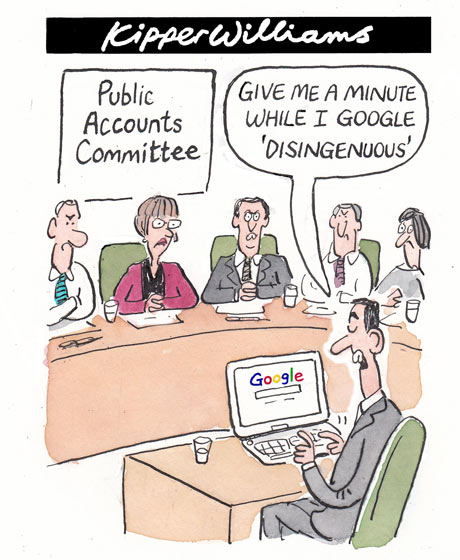
Kipper Williams on Google, guardian.co.uk, Thursday 16 May 2013 14.21 EDT, Source
Obama administration wants encryption backdoors
for domestic surveillance
Monday, September 27, 2010:
Xeni Jardin, at boing, boing, 11:53 am Mon, Sep 27, 2010, Article Source
In a New York Times article today by Charlie Savage, news that the Obama administration is proposing new legislation that would provide the U.S. Government with direct access to all forms of digital communication, "including encrypted e-mail transmitters like BlackBerry, social networking Web sites like Facebook and software that allows direct 'peer to peer' messaging like Skype."
Sound familiar? As Glenn Greenwald points out in his Salon analysis piece,
In other words, the U.S. Government is taking exactly the position of the UAE and the Saudis: no communications are permitted to be beyond the surveillance reach of U.S. authorities. The new law would not expand the Government's legal authority to eavesdrop -- that's unnecessary, since post-9/11 legislation has dramatically expanded those authorities -- but would require all communications, including ones over the Internet, to be built so as to enable the U.S. Government to intercept and monitor them at any time when the law permits. In other words, Internet services could legally exist only insofar as there would be no such thing as truly private communications; all must contain a "back door" to enable government officials to eavesdrop.
On Twitter last night, Ryan Singel pointed out this relevant snip from a National Research Council report rejecting the idea of mandated backdoors in encryption... in 1996.
It is true that the spread of encryption technologies will add to the burden of those in government who are charged with carrying out certain law enforcement and intelligence activities. But the many benefits to society of widespread commercial and private use of cryptography outweigh the disadvantages.
And the lack of backdoors doesn't seem to have put much of a damper on domestic surveillance, anyway:
Law enforcement officials have long warned that encryption technology allows criminals to hide their activities, but investigators encountered encrypted communications only one time during 2009's wiretaps. The state investigators told the court that the encryption did not prevent them from getting the plain text of the messages.
Read the NYT piece: U.S. Tries to Make It Easier to Wiretap the Internet.
And this CNET piece by Declan McCullagh, who's been covering this beat for longer than anyone I know, is an equally essential read. Snip:
Vice President Joe Biden proposed something quite similar in the 1990s. As I wrote in an earlier article, when Biden was chairman of the Senate Judiciary Committee, Biden introduced an anti-encryption bill called the Comprehensive Counter-Terrorism Act. It said: "It is the sense of Congress that providers of electronic communications services and manufacturers of electronic communications service equipment shall ensure that communications systems permit the government to obtain the plain text contents of voice, data, and other communications when appropriately authorized by law." It was Biden's bill--and the eventual threat of encryption being outlawed--that Phil Zimmermann said at the time "led me to publish PGP electronically for free that year."
Update: ACLU reaction here. "Mandating that all communications software be accessible to the government is a huge privacy invasion."
[Image: Code, a Creative Commons-licensed image from Anonymous Collective]
Keith Lampe ~ Co-Founder of YIPPIE and Progressive Activist Groups + Video Channel
Alert! Government Orders Youtube to Censor March
on Monsanto, D.C. & Protest VideosGoogle and YouTube Attack Freedom of Speech
Monsanto Zombies ???Corporate Cyberbully Google, via Government orders, is attacking freedom of speech on the world wide web by censoring YouTube; making YouTube just as evil as Google.
Bing Source: http://www.bing.com/search?q=Government+Orders
Yahoo Source: http://search.yahoo.com/search?p=Government+Orders
Why Is This Happening?
Supreme Court to democracy: Drop deadThe Supreme Court ruled against a 76-year-old Indiana farmer who had taken on Monsanto in a patent dispute over a genetically modified soybean seed.
Bing News Source: http://www.bing.com/news/search?q ... Monsanto+farmer
Yahoo News Source: http://news.search.yahoo.com/search?... Monsanto+farmer
FWIW
In the following article: Denialist Creed ~ Stupid Activists ~ While You Were Callng One Another Moron, We Took Over the World, about 1/3 down the page, it says:
Don't you need food?
No one seems to consider that we have the power to put tomato growers in prison.
We can pass laws that prohibit gardens, and then make up some scientific reason why you may only buy food from our sources.
If someone sees you growing tomatoes, they will report you to us, and then we will have you in our fields, working for us.
[snip]
You cannot hurt us, find us, or even imagine what we are up to. I am throwing you these few crumbs only so that you may, if you have a little good sense, obey and follow our orders.
Justice Department's pursuit of AP's phone records
is both extreme and dangerousThe claimed legal basis for these actions is unknown, but the threats they pose to a free press and the newsgathering process are clear
Glenn Greenwald, guardian.co.uk, Tuesday 14 May 2013 10.21 EDT, Article Source
Attorney General Eric Holder was required by DOJ regulations to personally approve efforts
to obtain phone records for AP journalists. Photograph: Mark Wilson/Getty Images(updated below)
Associated Press on Monday revealed that the Department of Justice (DOJ) "secretly obtained two months of telephone records of [its] reporters and editors", denouncing it as a "massive and unprecedented intrusion" into the news gathering process. In a letter sent yesterday to Attorney General Eric Holder, AP's President, Gary Pruitt, detailed that the phone records cover more than 20 telephone lines used by AP journalists, including their homes, offices and cell phones. He said the phones for which the DOJ obtained records also include ones at the AP bureaus in New York City, Washington DC, Hartford, and at the House of Representatives.
Pruitt wrote that "we regard this action by the Department of Justice as a serious interference with AP's constitutional rights to gather and report the news." He added that while AP is "evaluating its options", he "urgently request[ed]" that the DOJ "immediately return to the AP the telephone toll records" obtained by the DOJ "and destroy all copies." AP learned of the DOJ's acquisition of these records only after the fact, and thus had no opportunity to raise legal and constitutional objections nor attempt to negotiate to narrow the scope of the records to be sought. Pruitt's letter uses some inflammatory language as it is designed to advance the AP's case and to generate public anger, but that's entirely appropriate. The phone records reveal, at a minimum, all of the telephone numbers called by those AP journalists over the course of two months.
The ACLU last night condemned the DOJ's acts as "press intimidation" and said it constitutes "an unacceptable abuse of power". The Electronic Frontier Foundation denounced it as "a terrible blow against the freedom of the press and the ability of reporters to investigate and report the news". The New York Times' Editorial Page Editor Andy Rosenthal called the DOJ's actions "outrageous" while Washington Post Executive Editor Marty Baron said they were "shocking" and "disturbing". Even Democratic Sen. Pat Leahy, chairman of the Senate Judiciary Committee, said: "I am very troubled by these allegations and want to hear the government's explanation."
Numerous media reports convincingly speculated that the DOJ's actions arise out of a 2012 AP article that contained leaked information about CIA activity in Yemen, and the DOJ is motivated, in part, by a desire to uncover the identity of AP's sources. That 2012 AP story revealed that the CIA was able to "thwart" a planned bombing by the al-Qaida "affiliate" in that country of a US jetliner. AP had learned of the CIA actions a week earlier but "agreed to White House and CIA requests not to publish it immediately because the sensitive intelligence operation was still under way." AP revealed little that the US government itself was not planning to reveal and that would not have been obvious once the plot was successfully thwarted, as it explained in its story: "once those concerns were allayed, the AP decided to disclose the plot Monday despite requests from the Obama administration to wait for an official announcement Tuesday."
The legality of the DOJ's actions is impossible to assess because it is not even known what legal authority it claims nor the legal process it invoked to obtain these records. Particularly in the post-9/11 era, the DOJ's power to obtain phone records is, as I've detailed many times, dangerously broad. It often has the power to obtain those records without the person's knowledge (as happened here) and for a wildly broad scope of time (as also happened here). There are numerous instruments that have been vested in the DOJ to obtain phone records, many of which do not require court approval, including administrative subpoenas and "national security letters" (issued without judicial review); indeed, the Obama DOJ has previously claimed it has the power to obtain journalists' phone records without subpoeans using NSLs, and in its relentless pursuit to learn the identity of the source for one of New York Times' James Risen's stories, the Obama DOJ has actually claimed that journalists have no shield protections whatsoever in the national security context. It's also quite possible that they obtained the records through a Grand Jury subpoena, as part of yet another criminal investigation to uncover and punish leakers.
None of those processes for obtaining these invasive records requires a demonstration of probable cause or anything close to it. Instead, the DOJ must simply assert that the records "relate to" a pending investigation: a standard so broad that virtually every DOJ desire will fulfill it. Even if a court were involved in the acquisition of these records - and that's unlikely here - it typically does little more than act as rubber-stamping functionary, just as it does when secretly approving the DOJ's requests for FISA warrants. This is what is reaped from continuously vesting the US government with greater and greater surveillance powers in the name of Terrorism and other fears.
There has long been concern about the DOJ's snooping into the communications which journalists have with their sources precisely because the DOJ's power to obtain phone data and other sensitive records in secret is now so sweeping. Attempts to enact legislation to protect journalists from this type of concealed investigative intrusion into their source communications have been defeated in part due to the DOJ's insistence that it exercises this power responsibly and only in the most extreme cases.
Indeed, the DOJ has adopted its own binding regulations that impose constraints on its ability to obtain the phone records of journalists. Those regulations require that "all reasonable attempts should be made to obtain information from alternative sources" before subpoeans are issued; that "negotiations with the media shall be pursued in all cases in which a subpoena to a member of the news media is contemplated" unless the DOJ determines that such negotiations would "pose a substantial threat to the integrity of the investigation in connection with which the records are sought"; and that "no subpoena may be issued . . . for the telephone toll records of any member of the news media without the express authorization of the Attorney General". The White House has denied involvement in the acquisition of AP's phone records, but presumably, Attorney General Eric Holder personally approved (Esquire's Charles Pierce, in calling for the resignation of Holder, expresses skepticism about White House denials, but I'm neutral at this point on that specific question).
What makes the DOJ's actions so stunning here is its breadth. It's the opposite of a narrowly tailored and limited scope. It's a massive, sweeping, boundless invasion which enables the US government to learn the identity of every person whom multiple AP journalists and editors have called for a two-month period. Some of the AP journalists involved in the Yemen/CIA story and whose phone records were presumably obtained - including Adam Goldman and Matt Apuzzo - are among the nation's best and most serious investigative journalists; those two won the Pulitzer Prize last year for their superb work exposing the NYPD's surveillance program aimed at American Muslim communities. For the DOJ to obtain all of their phone records and those of their editors for a period of two months is just staggering.
It's the very opposite of what the DOJ has long claimed its guidelines protect. EFF details how the DOJ's actions "violated its own regulations for subpoenas to the news media." AP's Pruitt explained:
AP letterHe added:
AP letterThe key point is that all of this takes place in the ongoing War on Whistleblowers waged by the Obama administration. If you talk to any real investigative journalist, they will tell you that an unprecedented climate of fear has emerged in which their sources are petrified to talk to them. That the Obama administration has prosecuted double the number of whistleblowers under espionage statutes as all previous administrations combined has already severely chilled the news gathering process. Imagine what message this latest behavior sends to journalists and their sources: that at any moment, the phone records of even the nation's most establishment journalists can be secretly obtained by the DOJ, which has no compunction about doing so even in the most extreme and invasive manner.
The all-too-familiar axis that has enabled massive civil liberties assaults by the Obama administration - blindly partisan progressive media outlets and particularly obsequious self-styled neutral journalists - instantly sprung into action here and wasted no time jumping to the defense of the US government. TPM's Josh Marshall, while saying "there's still a very live question of whether this was a prudent action on the part of the DOJ", actually published an anonymous letter depicting the Obama DOJ as the victim here, saying AP "seeks to smear Justice" (in the annals of lowly journalistic behavior, printing anonymous emails defending the US government's surveillance actions and attacking targeted journalists is way down in the sewer, but that's the government-defending Josh Marshall in the Age of Obama). Similarly: before most people had even learned of the story, Think Progress purported to explain "Why The Department Of Justice Is Going After The Associated Press' Records" and, of course, offered the most benign and generous interpretation possible: they only did it to find out who is responsible for an "unauthorized and dangerous disclosure of classified information", quoting CIA Director John Brennan (offering instant "explainers" for even the most dubious of Obama administration actions is its typical tactic).
Some progressives actually tried to blame Republicans for the Obama DOJ's conduct because the GOP largely voted against the codification of some added protections for journalists from DOJ record-gathering in a proposed "shield law". But Obama, who supported those protections when he was in the Senate, "reversed course" when he was president - that could easily be the motto of his presidency - and it was his opposition that helped kill that bill.
Meanwhile, CNN's Wolf Blitzer, showing off the tough adversarial journalistic spirit for which he's so rightly celebrated, actually went on the air and said this:
Although if you look it from the other side, if there was a serious leak about an al-Qaida operation or whatever, they're trying to find out who may be leaking this information to the news media, do they occasionally have the right to secretly monitor our phone calls?"
Can you imagine what it's like to be an Obama official and - in the wake of these revelations - sit back and watch one of the nation's most celebrated journalists instantly suggest that the perhaps the US government should be monitoring his phone calls with his sources? Or watch progressives who spent the Bush years shrieking and convulsing at every story of secret Bush surveillance actions instantly attempt to justify what you've done before you've even done so yourself? And can you imagine the personality attributes that cause someone to read a story about a massive intrusion into journalists' communications with their sources and have your first instinct be to attack the targeted journalists and defend the US government?
That is why this is permitted to happen. During the Bush years, there were several similar reports of DOJ acquisition of journalists' phone records: I'll wager anything that not a single progressive site or prominent Democrat ever defended any of that or offered neutral "explainers" to provide justifying rationale. And it's hard to express how lame the justifying rationale is. The Obama administration does not mind leaks of classified national security information; to the contrary, they love such leaks and are the most prolific exploiters of them. What they dislike are leaks that they don't approve and/or which don't glorify the president. Their unprecedented attacks on whistleblowers ensures that only the White House but nobody else can disclose classified information to the public, which is another way of saying that they seek to seize the ultimate propaganda model whereby the president and he alone controls the flow of information to the public. That's what their very selective and self-serving war on leaks achieves.
It is true, as Kevin Drum suggests, that the DOJ has been obtaining phone records for quite some time in this manner, and that the angry reactions to this story are accounted for by the fact that, in this case, the targets are establishment journalists rather than marginalized Muslims or dissident groups. But there are unique dangers from having the government intrude into journalists' communications with their sources, which is what happens when they obtain their phone records in such a sweeping manner. At this point, leaks from government sources are the primary way we learn about what the government does, and the more that process is targeted and the more those involved are intimidated, the less it will happen. That, of course, is the point.
Despite how stunning the breadth of this invasion is, none of it is really surprising. But it does underscore just how extreme of a climate of fear has been deliberately imposed by the Obama administration on the news gathering process. As the New Yorker's Jane Mayer told whistleblower advocate Jesselyn Radack last year:
"When our sources are prosecuted, the news-gathering process is criminalized, so it's incumbent upon all journalists to speak up."
What the Obama DOJ is doing in all of these cases is not just an attack on investigative journalists and their sources, though it is that. It is, first and foremost, an attack on you: specifically on your ability to know what government officials are doing in the dark.
Q-and-A
Using a great new tool developed by the Guardian, I'll be hosting a Q-and-A session tomorrow in this column, from 2:00 to 4:00 pm EST, to discuss this story and others I've written about over the past few weeks. You can leave your questions here.
In a very timely development, the filmmaker Robert Greenwald (no relation) is about to release his outstanding documentary "War on Whistleblowers", detailing the Obama administration's targeting of whistleblowers. I'm briefly interviewed for it, as are numerous investigative journalists, news executives, and others. The trailer can be seen here.
UPDATE
Holder today said that he recused himself from the AP investigation early on, citing the fact that he himself had been interviewed by the FBI about the leaks. As a result, he said, it was the Deputy Attorney General, James Cole, who signed off on the acquisition of the AP phone records.
Meanwhile, the Reporters Committee for Freedom of the Press wrote a scathing letter to Holder today about these actions, explaining:
"In the thirty years since the Department issued guidelines governing its subpoena practice as it relates to phone records from journalists, none of us can remember an instance where such an overreaching dragnet for news gathering materials was deployed by the Department, particularly without notice to the affected reporters or an opportunity to seek judicial review.
"The scope of this action calls into question the very integrity of Department of Justice policies toward the press and its ability to balance, on its own, its police powers against the First Amendment rights of the news media and the public's interest in reporting on all manner of government conduct, including matters touching on national security which lie at the heart of this case."
As for Holder, he - needless to say - claimed that this investigation was necessary for "national security"; AP's president responds to that assertion here.
Gov't obtains wide AP phone records in probe
Mark Sherman, The Associated Press May 13, 2013, Article Source
WASHINGTON (AP) — The Justice Department secretly obtained two months of telephone records of reporters and editors for the Associated Press in what the news cooperative's top executive called a "massive and unprecedented intrusion" into how news organizations gather the news.
The records obtained by the Justice Department listed incoming and outgoing calls, and the duration of each call, for the work and personal phone numbers of individual reporters, general AP office numbers in New York, Washington and Hartford, Conn., and the main number for AP reporters in the House of Representatives press gallery, according to attorneys for the AP.
In all, the government seized those records for more than 20 separate telephone lines assigned to AP and its journalists in April and May of 2012. The exact number of journalists who used the phone lines during that period is unknown but more than 100 journalists work in the offices whose phone records were targeted on a wide array of stories about government and other matters.
In a letter of protest sent to Attorney General Eric Holder on Monday, AP President and Chief Executive Officer Gary Pruitt said the government sought and obtained information far beyond anything that could be justified by any specific investigation. He demanded the return of the phone records and destruction of all copies.
"There can be no possible justification for such an overbroad collection of the telephone communications of the Associated Press and its reporters. These records potentially reveal communications with confidential sources across all of the newsgathering activities undertaken by the AP during a two-month period, provide a road map to AP's newsgathering operations, and disclose information about AP's activities and operations that the government has no conceivable right to know," Pruitt said.
The government would not say why it sought the records. U.S. officials have previously said in public testimony that the U.S. attorney in Washington is conducting a criminal investigation into who may have leaked information contained in a May 7, 2012, AP story about a foiled terror plot. The story disclosed details of a CIA operation in Yemen that stopped an al-Qaeda plot in the spring of 2012 to detonate a bomb on an airplane bound for the United States.
In testimony in February, CIA Director John Brennan noted that the FBI had questioned him about whether he was AP's source, which he denied. He called the release of the information to the media about the terror plot an "unauthorized and dangerous disclosure of classified information."
Prosecutors have sought phone records from reporters before, but the seizure of records from such a wide array of AP offices, including general AP switchboards numbers and an office-wide shared fax line, is unusual and largely unprecedented.
In the letter notifying the AP received Friday, the Justice Department offered no explanation for the seizure, according to Pruitt's letter and attorneys for the AP. The records were presumably obtained from phone companies earlier this year although the government letter did not explain that. None of the information provided by the government to the AP suggested the actual phone conversations were monitored.
Among those whose phone numbers were obtained were five reporters and an editor who were involved in the May 7, 2012 story.
The Obama administration has aggressively investigated disclosures of classified information to the media and has brought six cases against people suspected of leaking classified information, more than under all previous presidents combined.
Justice Department published rules require that subpoenas of records from news organizations must be personally approved by the attorney general but it was not known if that happened in this case. The letter notifying AP that its phone records had been obtained though subpoenas was sent Friday by Ronald Machen, the U.S. attorney in Washington.
Spokesmen in Machen's office and at the Justice Department had no immediate comment on Monday.
The Justice Department lays out strict rules for efforts to get phone records from news organizations. A subpoena can only be considered after "all reasonable attempts" have been made to get the same information from other sources, the rules say. It was unclear what other steps, in total, the Justice Department has taken to get information in the case.
A subpoena to the media must be "as narrowly drawn as possible" and "should be directed at relevant information regarding a limited subject matter and should cover a reasonably limited time period," according to the rules.
The reason for these constraints, the department says, is to avoid actions that "might impair the news gathering function" because the government recognizes that "freedom of the press can be no broader than the freedom of reporters to investigate and report the news."
News organizations normally are notified in advance that the government wants phone records and enter into negotiations over the desired information. In this case, however, the government, in its letter to the AP, cited an exemption to those rules that holds that prior notification can be waived if such notice, in the exemption's wording, might "pose a substantial threat to the integrity of the investigation."
It is unknown whether a judge or a grand jury signed off on the subpoenas.
The May 7, 2012, AP story that disclosed details of the CIA operation in Yemen to stop an airliner bomb plot occurred around the one-year anniversary of the May 2, 2011, killing of Osama bin Laden.
The plot was significant because the White House had told the public it had "no credible information that terrorist organizations, including al-Qaida, are plotting attacks in the U.S. to coincide with the (May 2) anniversary of bin Laden's death."
The AP delayed reporting the story at the request of government officials who said it would jeopardize national security. Once government officials said those concerns were allayed, the AP disclosed the plot because officials said it no longer endangered national security. The Obama administration, however, continued to request that the story be held until the administration could make an official announcement.
The May 7 story was written by reporters Matt Apuzzo and Adam Goldman with contributions from reporters Kimberly Dozier, Eileen Sullivan and Alan Fram. They and their editor, Ted Bridis, were among the journalists whose April-May 2012 phone records were seized by the government.
Brennan talked about the AP story and leaks investigation in written testimony to the Senate. "The irresponsible and damaging leak of classified information was made ... when someone informed the Associated Press that the U.S. Government had intercepted an IED (improvised explosive device) that was supposed to be used in an attack and that the U.S. Government currently had that IED in its possession and was analyzing it," he said.
He also defended the White House's plan to discuss the plot immediately afterward. "Once someone leaked information about interdiction of the IED and that the IED was actually in our possession, it was imperative to inform the American people consistent with Government policy that there was never any danger to the American people associated with this al-Qa'ida plot," Brennan told senators.
Nobody Pays Attention the First Time Around
Telecom Crimes
Violation of the Fourth Amendment to the Constitution
Violation of the First Amendment to the Constitution
Unlawful electronic surveillance or disclosure or use of information obtained by electronic surveillance in violation of 50 U.S.C. §1809.
Unlawful interception, use or disclosure of Class communications in violation of 18 U.S.C. § 2511
Unlawful solicitation and obtained disclosure of the contents of communications in violation of 18 U.S.C. § 2702(a)(1) or (a)(2)
Unlawful solicitation and obtained disclosure of non-content records or other information in violation of 18 U.S.C. § 2702(a)(3)
Violation of the Administrative Procedures Act
Violation of the constitutional principle of separation of powers
Telecom Punishment
[Click Here to Read Telecom Crimes and Punishment, where a criminal Congress gave free passes to criminals who knowingly broke the following laws; displaying scorn of U.S. citizens:
Congress votes to immunize lawbreaking telecoms, legalize warrantless eavesdropping
Senate Approves Telco Amnesty, Legalizes Bush's Secret Spy Program
Wiretapping, Telecom Companies, and You | The Legality
Top Internet Threats: Censorship to Warrantless Surveillance
Cybersecurity Act Would Give President Power to 'Shut Down' Internet
Public Knowledge Rejects: Telecom Industry Assault on Consumers
Death Of The Internet: Unprecedented Censorship Bill Passes in UK
Lieberman Bill Gives Feds ‘Emergency' Powers to Secure Civilian Nets
9 Reasons Wired Readers Should Wear Tinfoil Hats
We The People Stimulus Package ~ via Bruce ~ http://vimeo.com/60416854
Google Is Evil~ Breaking a promise
Say NO to Corporate Cyberbullies
Stephen Hawking joins academic boycott of Israel
Physicist pulls out of conference hosted by president Shimon Peres in protest at treatment of Palestinians
Harriet Sherwood and Matthew Kalman in Jerusalem, The Guardian, Tuesday 7 May 2013, Article Source
A statement published with Stephen Hawking's approval said his withdrawal was
based on advice from academic contacts in Palestine. Photograph: Facundo Arrizabalaga/EPAProfessor Stephen Hawking is backing the academic boycott of Israel by pulling out of a conference hosted by Israeli president Shimon Peres in Jerusalem as a protest at Israel's treatment of Palestinians.
Hawking, 71, the world-renowned theoretical physicist and former Lucasian Professor of Mathematics at the University of Cambridge, had accepted an invitation to headline the fifth annual president's conference, Facing Tomorrow, in June, which features major international personalities, attracts thousands of participants and this year will celebrate Peres's 90th birthday.
Hawking is in very poor health, but last week he wrote a brief letter to the Israeli president to say he had changed his mind. He has not announced his decision publicly, but a statement published by the British Committee for the Universities of Palestine with Hawking's approval described it as "his independent decision to respect the boycott, based upon his knowledge of Palestine, and on the unanimous advice of his own academic contacts there".
Hawking's decision marks another victory in the campaign for boycott, divestment and sanctions targeting Israeli academic institutions.
In April the Teachers' Union of Ireland became the first lecturers' association in Europe to call for an academic boycott of Israel, and in the United States members of the Association for Asian American Studies voted to support a boycott, the first national academic group to do so.
In the four weeks since Hawking's participation in the Jerusalem event was announced, he has been bombarded with messages from Britain and abroad as part of an intense campaign by boycott supporters trying to persuade him to change his mind. In the end, Hawking told friends, he decided to follow the advice of Palestinian colleagues who unanimously agreed that he should not attend.
Hawking's decision met with abusive responses on Facebook, with many commentators focusing on his physical condition, and some accusing him of antisemitism.
By participating in the boycott, Hawking joins a small but growing list of British personalities who have turned down invitations to visit Israel, including Elvis Costello, Roger Waters, Brian Eno, Annie Lennox and Mike Leigh.
However, many artists, writers and academics have defied and even denounced the boycott, calling it ineffective and selective. Ian McEwan, who was awarded the Jerusalem Prize in 2011, responded to critics by saying: "If I only went to countries that I approve of, I probably would never get out of bed … It's not great if everyone stops talking."
Noam Chomsky, a prominent supporter of the Palestinian cause, has said that he supports the "boycott and divestment of firms that are carrying out operations in the occupied territories" but that a general boycott of Israel is "a gift to Israeli hardliners and their American supporters".
Hawking has visited Israel four times in the past. Most recently, in 2006, he delivered public lectures at Israeli and Palestinian universities as the guest of the British embassy in Tel Aviv. At the time, he said he was "looking forward to coming out to Israel and the Palestinian territories and excited about meeting both Israeli and Palestinian scientists".
Since then, his attitude to Israel appears to have hardened. In 2009, Hawking denounced Israel's three-week attack on Gaza, telling Riz Khan on Al-Jazeera that Israel's response to rocket fire from Gaza was "plain out of proportion … The situation is like that of South Africa before 1990 and cannot continue."
Israel Maimon, chairman of the presidential conference said: "This decision is outrageous and wrong.
"The use of an academic boycott against Israel is outrageous and improper, particularly for those to whom the spirit of liberty is the basis of the human and academic mission. Israel is a democracy in which everyone can express their opinion, whatever it may be. A boycott decision is incompatible with open democratic discourse."
In 2011, the Israeli parliament passed a law making a boycott call by an individual or organisation a civil offence which can result in compensation liable to be paid regardless of actual damage caused. It defined a boycott as "deliberately avoiding economic, cultural or academic ties with another person or another factor only because of his ties with the State of Israel, one of its institutions or an area under its control, in such a way that may cause economic, cultural or academic damage".
• This article was amended on 8 May 2013. The original described Hawking as Lucasian Professor of Mathematics at the University of Cambridge. He stepped down in 2009.
Syria ~ More Red Lines
Steve Bell cartoon on the Obama administration and Syria, The Guardian, Cartoon SourceJohn McCain has accused Barack Obama of writing his red lines over possible chemical weapons use in 'disappearing ink'
John McCain Can Not Be Trusted
John McCain supported Israel's murder and maiming of United States Naval personnel aboard the USS Liberty!
Reasons Why John McCain Can Not Be Trusted
According to Chickenhawk War Criminal George BushMcCain "abandoned the veterans" on POW/MIA and Agent Orange issues: "He came home from Vietnam and forgot us.
McCain's ads were "about as low a blow as you can give in a Republican primary."
[McCain] fathered a black child out of wedlock.
[McCain's] wife Cindy was a drug addict, [McCain] was a homosexual, and that [McCain] was a "Manchurian Candidate" traitor or mentally unstable from his North Vietnam POW days.
McCain was a favorite of liberal Democrats [Source]
How Many Terrorists and Politicians Are In Prison
for the May 4, 1970 Kent State Student Massacre?NONE !
Did Government Take Their Guns?
NO !
Government was responsible for the murders!
John Filo's iconic Pulitzer Prize-winning Kent State Massacre Photograph via WikipediaMessage to Government via War Criminal Dick Cheney:
May 15, 1969 - Bloody Thursday
Photo: Ed Krishner ~ Source: http://www.peoplespark.org/69gall4.htmlRepublicans Authorize Murder & Maiming of Students
Orders issued by Crook Richard M. Nixon and the Treasonous Ronald W. Reagan
and Democrats Did Nothing to Prevent this Atrocity !!!You have probably seen the above title posted here, over the years, and here is why. Early on Thursday morning May 15, 1969, after returning from an 'Angel's of Light' party with Allen Ginsburg, who was into his "home, home, home" harmonium Blake phase, a friend and I drank what we thought was a half bottle of orange juice someone had left in the refrigerator.
Just as we were 'downing' the last gulp of juice, the boyfriend of one of the women at the house came into the kitchen and said, "Where did you get that juice from?"
As it turned out, the orange juice contained a quarter ounce of mescaline sulfate and we were on our way to being thoroughly dosed.
Seeing it was going to be one of those 'sunshine daydream' mornings, we headed down Telegraph Ave. to UC Berkeley, where we would take a right at the clock tower, and walk up to Tilden Park, to hang out at the lake for the day.
About one half block from the campus we heard, what sounded like, gun shots and saw a large group of screaming people running toward us. Not knowing what to do, we began running South, with the crowd. ~ [Continue Reading]
Photo: Ron Stinnett ~ Source: http://www.peoplespark.org/69gall6.htmlAre all telephone calls recorded
and accessible to the US government?A former FBI counterterrorism agent claims on CNN that this is the case
Glenn Greenwald, guardian.co.uk, Saturday 4 May 2013 08.22 EDT, Article Source
Former FBI counterterrorism agent Tim Clemente, on CNN, discussing
government's surveillance capabilities Photograph: CNN screegrabThe real capabilities and behavior of the US surveillance state are almost entirely unknown to the American public because, like most things of significance done by the US government, it operates behind an impenetrable wall of secrecy. But a seemingly spontaneous admission this week by a former FBI counterterrorism agent provides a rather startling acknowledgment of just how vast and invasive these surveillance activities are.
Over the past couple days, cable news tabloid shows such as CNN's Out Front with Erin Burnett have been excitingly focused on the possible involvement in the Boston Marathon attack of Katherine Russell, the 24-year-old American widow of the deceased suspect, Tamerlan Tsarnaev. As part of their relentless stream of leaks uncritically disseminated by our Adversarial Press Corps, anonymous government officials are claiming that they are now focused on telephone calls between Russell and Tsarnaev that took place both before and after the attack to determine if she had prior knowledge of the plot or participated in any way.
On Wednesday night, Burnett interviewed Tim Clemente, a former FBI counterterrorism agent, about whether the FBI would be able to discover the contents of past telephone conversations between the two. He quite clearly insisted that they could:
BURNETT: Tim, is there any way, obviously, there is a voice mail they can try to get the phone companies to give that up at this point. It's not a voice mail. It's just a conversation. There's no way they actually can find out what happened, right, unless she tells them?
CLEMENTE: "No, there is a way. We certainly have ways in national security investigations to find out exactly what was said in that conversation. It's not necessarily something that the FBI is going to want to present in court, but it may help lead the investigation and/or lead to questioning of her. We certainly can find that out.
BURNETT: "So they can actually get that? People are saying, look, that is incredible.
CLEMENTE: "No, welcome to America. All of that stuff is being captured as we speak whether we know it or like it or not."
"All of that stuff" - meaning every telephone conversation Americans have with one another on US soil, with or without a search warrant - "is being captured as we speak".
On Thursday night, Clemente again appeared on CNN, this time with host Carol Costello, and she asked him about those remarks. He reiterated what he said the night before but added expressly that "all digital communications in the past" are recorded and stored:
Let's repeat that last part: "no digital communication is secure", by which he means not that any communication is susceptible to government interception as it happens (although that is true), but far beyond that: all digital communications - meaning telephone calls, emails, online chats and the like - are automatically recorded and stored and accessible to the government after the fact. To describe that is to define what a ubiquitous, limitless Surveillance State is.
There have been some previous indications that this is true. Former AT&T engineer Mark Klein revealed that AT&T and other telecoms had built a special network that allowed the National Security Agency full and unfettered access to data about the telephone calls and the content of email communications for all of their customers. Specifically, Klein explained "that the NSA set up a system that vacuumed up Internet and phone-call data from ordinary Americans with the cooperation of AT&T" and that "contrary to the government's depiction of its surveillance program as aimed at overseas terrorists . . . much of the data sent through AT&T to the NSA was purely domestic." But his amazing revelations were mostly ignored and, when Congress retroactively immunized the nation's telecom giants for their participation in the illegal Bush spying programs, Klein's claims (by design) were prevented from being adjudicated in court.
That every single telephone call is recorded and stored would also explain this extraordinary revelation by the Washington Post in 2010:
Every day, collection systems at the National Security Agency intercept and store 1.7 billion e-mails, phone calls and other types of communications.
It would also help explain the revelations of former NSA official William Binney, who resigned from the agency in protest over its systemic spying on the domestic communications of US citizens, that the US government has "assembled on the order of 20 trillion transactions about US citizens with other US citizens" (which counts only communications transactions and not financial and other transactions), and that "the data that's being assembled is about everybody. And from that data, then they can target anyone they want."
Despite the extreme secrecy behind which these surveillance programs operate, there have been periodic reports of serious abuse. Two Democratic Senators, Ron Wyden and Mark Udall, have been warning for years that Americans would be "stunned" to learn what the US government is doing in terms of secret surveillance.
Information Awareness OfficeStrangely, back in 2002 - when hysteria over the 9/11 attacks (and thus acquiescence to government power) was at its peak - the Pentagon's attempt to implement what it called the "Total Information Awareness" program (TIA) sparked so much public controversy that it had to be official scrapped. But it has been incrementally re-instituted - without the creepy (though honest) name and all-seeing-eye logo - with little controversy or even notice.
Back in 2010, worldwide controversy erupted when the governments of Saudi Arabia and the United Arab Emirates banned the use of Blackberries because some communications were inaccessible to government intelligence agencies, and that could not be tolerated. The Obama administration condemned this move on the ground that it threatened core freedoms, only to turn around six weeks later and demand that all forms of digital communications allow the US government backdoor access to intercept them. Put another way, the US government embraced exactly the same rationale invoked by the UAE and Saudi agencies: that no communications can be off limits. Indeed, the UAE, when responding to condemnations from the Obama administration, noted that it was simply doing exactly that which the US government does:
"'In fact, the UAE is exercising its sovereign right and is asking for exactly the same regulatory compliance - and with the same principles of judicial and regulatory oversight - that Blackberry grants the US and other governments and nothing more,' [UAE Ambassador to the US Yousef Al] Otaiba said. 'Importantly, the UAE requires the same compliance as the US for the very same reasons: to protect national security and to assist in law enforcement.'"
That no human communications can be allowed to take place without the scrutinizing eye of the US government is indeed the animating principle of the US Surveillance State. Still, this revelation, made in passing on CNN, that every single telephone call made by and among Americans is recorded and stored is something which most people undoubtedly do not know, even if the small group of people who focus on surveillance issues believed it to be true (clearly, both Burnett and Costello were shocked to hear this).
Some new polling suggests that Americans, even after the Boston attack, are growing increasingly concerned about erosions of civil liberties in the name of Terrorism. Even those people who claim it does not matter instinctively understand the value of personal privacy: they put locks on their bedroom doors and vigilantly safeguard their email passwords. That's why the US government so desperately maintains a wall of secrecy around their surveillance capabilities: because they fear that people will find their behavior unacceptably intrusive and threatening, as they did even back in 2002 when John Poindexter's TIA was unveiled.
Mass surveillance is the hallmark of a tyrannical political culture. But whatever one's views on that, the more that is known about what the US government and its surveillance agencies are doing, the better. This admission by this former FBI agent on CNN gives a very good sense for just how limitless these activities are.
How Did This Happen?
The following was posted to a Usenet Group on Tuesday 11 April 1989:
RISKS-LIST: RISKS-FORUM Digest Tuesday 11 April 1989 Volume 8 : Issue 54
FORUM ON RISKS TO THE PUBLIC IN COMPUTERS AND RELATED SYSTEMS ACM Committee on Computers and Public Policy, Peter G. Neumann, moderator
Date: Tue, 11 Apr 89 08:12:04 PDT
From: cas@toad.com (Curtis Spangler)
Subject: NSA and Not Secure AgenciesSan Francisco Chronicle, Chronicle Wire Services, April 11, 1989:
"Computer Group Wary of Security Agency
A public interest group said yesterday that the National Security Agency, the nation's biggest intelligence agency, could exert excessive control over a program to strengthen the security of computer systems throughout the federal government.
The group, Computer Professionals for Social Responsibility - based in Palo Alto - urged key members of Congress to focus "particularly close scrutiny" on the agency's role in helping to implement legislation aimed at safeguarding sensitive but unclassified information in federal computers.
"There is a constant risk that the federal agencies, under the guise of enhancing computer security, may find their programs - to the extent that they rely upon computer systems - increasingly under the supervision of the largest and most secretive intelligence organization in the country," it said."
During the '90s:
SELinux Background
Researchers in the National Information Assurance Research Laboratory of the National Security Agency (NSA) worked with Secure Computing Corporation (SCC) to develop a strong, flexible mandatory access control architecture based on Type Enforcement, a mechanism first developed for the LOCK system. The NSA and SCC developed two Mach-based prototypes of the architecture: DTMach and DTOS. The NSA and SCC then worked with the University of Utah's Flux research group to transfer the architecture to the Fluke research operating system. During this transfer, the architecture was enhanced to provide better support for dynamic security policies. This enhanced architecture was named Flask. The NSA integrated the Flask architecture into the Linux® operating system to transfer the technology to a larger developer and user community. The architecture has been subsequently mainstreamed into Linux and ported to several other systems, including the Solaris™ (Sun Microsystems/Oracle) operating system, the FreeBSD® operating system, and the Darwin (Apple) kernel, spawning a wide range of related work.
http://www.nsa.gov/research/selinux/background.shtml
Images Via Wikipedia, the free encyclopediaIt is important to remember Democrats and Republicans supported Israel's murder and maiming of United States Naval personnel aboard the USS Liberty, supplied Iraq with biological and chemical weapons from U.S. manufacturers, appointed Bush president, passed the Patriot Act against U.S. citizens, gave Telecom companies a free pass for knowingly breaking law, and more than likely had something to do with the mass murders of 9/11.
George W. Bush Asks Congress For $90 Billion
Tax Payer Dollars To Help Fight War On Criticism
President Bush You Hid from the Vietnam War ~ We Served ~ How Dare You Ask Our Children to Fight ~ COWARD!WASHINGTON, DC - Citing the need to safeguard "America's most vital institutions and politicians" against potentially devastating attacks, President Bush asked Congress to sign off Monday on a $90 billion funding package to help fight the ongoing War On Criticism.
"Sadly, the threat of criticism is still with us," Bush told members of Congress during a 2 p.m. televised address. "We thought we had defeated criticism with our successes in Afghanistan and Iraq. We thought we had struck at its very heart with the broad discretionary powers of the USA Patriot Act. And we thought that the ratings victory of Fox News, America's News Channel, might signal the beginning of a lasting peace with the media. Yet, despite all this, criticism abounds."
Critical activities, Bush noted, have not returned to pre-Sept. 11 levels, when well-organized, coordinated attacks on his administration were carried out on a near-daily basis. But in spite of the National Criticism Alert Level holding steady at yellow (elevated), administration officials warn of severe impending attacks.
"We've become too complacent," Attorney General John Ashcroft said. "We've grown accustomed to thinking of criticism as something that only happens to people in other political parties. But this administration needs this funding to counter a very real threat to its reputation."
Ashcroft said the Justice Department, working closely with the CIA and FBI, has identified more than 300 potential targets, ranging from the Bush Administration's inability to produce the weapons of mass destruction used to justify the war with Iraq to its deficit-ballooning fiscal policies.
"I doubt I could protect my ongoing Halliburton cronyism from critical strikes with just a few million dollars-especially if it was not accompanied by powerful preemptive legislation," Vice-President Dick Cheney said. "We need to build stronger anti-criticism defense shields in this country. And the time to act is now, before the media say something negative about us."
If the funding is approved, the Bush Administration will act swiftly to shore up numerous areas of vulnerability. Among the actions: ensuring that the White House is defended against verbal snipers, safeguarding the president's past illicit actions from biographical weapons, and sealing off the largest sources of domestic criticism by securing and patrolling the nation's newsrooms.
Congressional leaders are already pledging their support for the plan.
"As government officials, we have an absolute obligation to protect the leader of this country from future acts of criticism," U.S. Sen. Orrin Hatch (R-UT) ??? said. "And it will not be cheap, easy, or quick."
"We're all in this together," Speaker of the House Dennis Hastert ??? said. "You attack one American politician, you attack us all."
Q. What is George Bush's position on Roe vs. Wade?
A. He really did not care how people got out of New Orleans after Hurricane Katrina.
Things don't change, people do
Nothing has Changed: Here are previous Month of May Archives
2007~ 2007.05 ~ 2008 ~ 2008.05 ~ 2009 ~ 2009.05
2010 ~ 2010.05 ~ 2011 ~ 2011.05 ~ 2012 ~ 2012.05 ~ 2013 ~ 2013.05
Due to insinuation, Google has eliminated
over one half (1/2) of flyingsnail.com visitors
Click to View ~ Why Google Has Become Evil
Archives:
Where to find old posts
LINKS:
Where most information from this page went.
Boptime with Even Steven + The Legends of Wilmington Jazz
Saturday, 6 AM Eastern time, 3 AM Pacific time:
MP3 Stream ~ Low 24K ~ High 128K ~ Real Audio ~ Low 24K ~ High 128K ~ Windows ~ Low 24K ~ High 128K
Karl Cohen ~ Association International du Film d'Animation-SF Newsletter
ASIFA~SF NEWSLETTER
Association International du Film d'Animation
(International Animated Film Association)
May 2013In this issue highlights include two articles on:
THE GRAND OPENING OF THE NEW EXPLORATORIUM & ANIMATION AT THE SF INTERNATIONAL FILM FESTIVAL
AT ASIFA-SF'S CAREERS IN ANIMATION EVENT THE PANEL WAS REALISTIC BUT NOT PESSIMISTIC ABOUT THE CURRENT STATE OF THE INDUSTRY
DISNEY IS LAYING OFF PEOPLE AT FORMER LUCAS OWNED COMPANIES & TIPPETT HAS LAID-OFF 40% OF THEIR STAFF ~ ANOTHER REASON WHY U.S. PRODUCED FEATURES ARE BEING DONE ABROAD
ASIFA-SF members are invited Tues May 7th 7:00-8:30, TOM SITO, BOOK SIGNING AT THE CARTOON ART MUSEUM
9th EDITION OF THE FETE DE L'ANIM IN TOURCOING AND LILLE, FRANCE by Nancy Denney-Phelps
ANIMA - THE BRUSSELS ANIMATION FESTIVAL FEBRUARY 8 THROUGH 17 2013 BRUSSELS, BELGIUM by Nancy Denny-Phelps
Notes from ~@~
Things don't change, people do
Nothing has Changed: Here are previous Month of May Archives
2007~ 2007.05 ~ 2008 ~ 2008.05 ~ 2009 ~ 2009.05
2010 ~ 2010.05 ~ 2011 ~ 2011.05 ~ 2012 ~ 2012.05 ~ 2013 ~ 2013.05Radical Acoustic, Saturday, May 4, 2013, 4 to 6pm
Next Performance: SATURDAY, May 4, 2013 via John Radogno ~ Click to View Page
Paul Krassner ~ The Realist/Writer/Comic/Investigative Satirist
Masturbate~A~Thon
by Paul Krassner, @ http://www.alternet.org/
Did you know that May is National Masturbation Month? It was originally declared in 1995 by Good Vibrations--a San Francisco shop specializing in sex toys, erotic books and adult videos—after Surgeon General Dr. Joycelyn Elders was fired by Bill Clinton for responding to a question about masturbation at a UN conference, “I think that is part of human sexuality, and perhaps it should be taught” in the context of sex education classes. Ironically, the president never had intercourse with Monica Lewinsky, but rather, she testified, after she performed incomplete fellatio, he would masturbate into the sink in the Oval Office bathroom, not to mention ejaculating onto her blue dress.
As National Masturbation Month evolved, Good Vibrations added aspects such as the Masturbation Hall of Fame, lists of euphemisms for masturbation and places to do it, and eventually, in 2000, the Masturbate-a-thon was launched by the store’s staff sexologist, Dr. Carol Queen and Robert, her life partner and co-founder of the Center for Sex & Culture. In 2012, Carol’s favorite moment occurred at the “Greatest Distance Ejaculated” competition when challenger Punk Nine broke the record by shooting his semen 13 feet. He had practiced by ejaculating into the Pacific Ocean.
“There was also a female contestant,” Carol informed me, “and she did not go quite as far, but that might be because so much of her [squirting] went up in the air. Her boyfriend compared her to the Bellagio fountain, which is certainly a romantic and flattering thing to say to a lady.”
In 2011, because the Center for Sex & Culture was moving to a new location and there wasn’t as much space for the Masturbate-a-thon, Carol announced, “We are inviting women to attend on Saturday evening, plus couples. We’ll have part of the room blocked off for women only, and those who want to can also mingle with the couples. On Sunday afternoon, a men-only area will share the room with a men-plus-couples area. What about trans-identified folks? Please be welcome at either or both. If space allows, a voyeur section may also be included.”
At a previous Masturbate-a-thon, which lasted from 10 a.m. to midnight. the “Longest Time Spent Masturbating” champion, Masonobu Sato, who flew in from Japan for the occasion, also achieved a world record, jerking off for over 9 hours. “The then-current record-holder was there to defend his title,” Carol observed, “and that guy did a lot of Tantra, so he was a fierce opponent.”
However, in view of “GIF porn”—online compressed images in 5-second video looped-clips—who knows, in the age of shrinking attention span, maybe this year the Masturbate-a-thon will feature the “Shortest Time Spent Masturbating” competition. Suddenly, premature ejaculations have become something to be proud of. Just try not to come on your iPhone while you’re driving, or Siri will scold you.
Pornography has always served as “Masturbation Helper.” During the trial of fertilizer salesman Scott Peterson, the prosecutor presented evidence that, three weeks after Peterson’s wife Laci disappeared, he added a couple of hard-core porn channels to the programming on his satellite dish. Defense attorney Mark Geragos called this “as great a form of character assassination as I don’t know what,” although his client was on trial for the murder of his wife and their unborn child.
Gonzo sex writer and educator Theresa Reed, also known as Darklady, organized and promoted the first Masturbate-a-thon in Portland, Oregon. Her invitation stated: “Our special location will be revealed when you join the elite Benevolent Society of Masturbators. Come dressed erotically and patriotically.” The party had a patriotic theme, “Masturbate Your Way to Freedom.” The logo was an American Eagle clutching a vibrator and a tube of lube.
The event--benefiting the National Coalition for Sexual Freedom, the Center for Sex & Culture, and Planned Parenthood--featured free food and drinks, condoms and lubrication, DJs and live bands, strippers and porn stars, door prizes and streaming video on the Internet. The Thrill-Hammer Orgazmatron machine provided participants with a popular competition. The woman who rode it the longest became the winner. She was crowned Miss Masturbate-a-Thon and presented with a beautiful tiara, matching the afterglow of multiple orgasms galore—yet another competition.
“We held the party at the wonderfully pro-sex space at Ascension Dungeon,” Darklady told me, “and had some of the most agreeable and competent security folks I’ve had the privilege to work with. I was very impressed by the enthusiastic turn-out and the innovating things people did. One man brought a pyramid-like sex swing. Local cable host Harry Lime came along with his camera crew to videotape the Thrill-Hammer fun, and people flocked to both the camera-friendly and camera-free rooms. We had no unpleasant incidents and everyone seemed to have a great time.”
The main room was masturbation-free. Beyond that was a large open space with with the Orgazmatron. “Thrill-Hammer excitement will be broadcast live on the Internet,” Darklady declared, “but the shy and saucy can protect their identity and still get a good internal massage by wearing one of the lovely masks generously donated by Bad Attitude. A modesty screen will also shield the especially shy from view. Please limit yourself to masturbation as this is, after all, a celebration of self-love.”
There was a silent auction of goods donated by local businesses and national sex celebrities. Literature was available so that guests could learn more about the charitable groups they were helping to support. Promotional material from sponsoring companies was prominently displayed. The doors to the Masturbate-a-thon opened at 6 p.m., and the event ended at 2 a.m. Guests had to sign a liability waiver “in case you slip in your own spunk.”
The month of May is not only National Masturbation Month. It has also been designated as Teen Pregnancy Prevention Month. Isn’t it encouraging when different causes can work together with such perfect symbiosis? And always remember that you will never be rejected by your own hand.
Nobody for President = NONE OF THE ABOVE should be on voter ballots
Sing Out and Celebrate!
Benefit for Camp Winnarainbow
Jackson Browne with Wavy Gravy, MC
Sunday May 12th, 2013 at 3pmJoin us for an afternoon of music, food and celebration at the intimate Coventry Grove in Kensington as we honor
30 years of the Grace & Joy Scholarship Fund.Reception, Buffet & Drinks ~ Performance by JACKSON BROWNE ~ Ongoing Silent Auction
$200 General Seating ~ $500 Circle of FUNds ~ Purchase tickets at http://campwinnarainbow.eventbrite.com
Circle of FUNds includes priority seating, limited edition signed event poster & access to an intimate post-concert reception with the artists.
Happy 77th Birthday Wavy Gravy
(May 15th) Love FlyingSnail & Friends
Seva Foundation Celebrates Its 35th Anniversary
Kirtan benefit concert
Featuring: Snatam Kaur, Jai Uttal, C.C. White & Shimshai
with host Wavy Gravy ~ Click for Information
Monday, May 27th - Palace of Fine Arts Theater in San Francisco
Freedom of expression and freedom of speech aren't really important unless they're heard...It's hard for me to stay silent when I keep hearing that peace is only attainable through war. And there's nothing more scary than watching ignorance in action. So I dedicated this Emmy to all the people who feel compelled to speak out and not afraid to speak to power and won't shut up and refuse to be silenced. ~ Tommy Smothers
Closing Argument
Boston Legal Speech on America and more
Please Click to View Video ~ http://vimeo.com/47165357One Can Lead A Horse To Water, But...
Until there is a solution for this, where one solution has been provided, Nobody will bring Peace to Our Times, feed the hungry, care for the sick, and bake apple pie better than Mom. (otoh) If None of the Above was on voter ballots, it would be a huge step towards recovering U.S. political control, and Nobody gets it.
George Carlin, The American Dream ~ http://vimeo.com/37487342
Oh, I hope that I see you again I never even caught your name As you looked through my window pane ~~ So I'm writing this message today I'm thinking that you'll have a way Of hearing the notes in my tune ~~ Where are you going? Where have you been? I can imagine other worlds you have seen ~~ Beautiful faces and music so serene ~~ So I do hope I see you again My universal citizen You went as quickly as you came ~~ You know the power Your love is right You have good reason To stay out of sight ~~ But break our illusions and help us Be the light ~ Message by Michael Pinder
Without love in the dream, it will never come true. ~ Jerry Garcia/Robert Hunter
The man whispered, "God, speak to me" and a meadowlark sang. But the man did not hear.
So the man yelled "God, speak to me" and the thunder rolled across the sky. But the man did not listen.
The man looked around and said, "God let me see you" and a star shined brightly. But the man did not notice.
And the man shouted, "God show me a miracle" and a life was born. But the man did not know.
So the man cried out in despair, "Touch me God, and let me know you are there"
Whereupon God reached down and touched the man. But the man brushed the butterfly away and walked on.
Don't miss out on a blessing because it isn't packaged the way you expect.
